2003

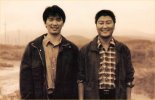


From left: "Untold Scandal", "Memories of Murder", "A Tale of Two Sisters", "Save the Green Planet"
The year 2003 opened on a somewhat pessimistic note, with talk of a crisis in film finance and rumors that Korea's two biggest film companies would merge (a development that was later called off). Creatively too, the first few months of the year provided few titles to get excited about. However beginning in April, a string of very good films -- mixed in with the very bad -- ultimately turned 2003 into one of Korean cinema's best years yet, from both an artistic and a commercial perspective.
One of the most pleasant surprises of 2003 was that local audiences showed strong support of distinctive, challenging filmmakers at the top of their form. Bong Joon Ho's critically-acclaimed second film Memories of Murder led the pack with over five million admissions ($26m gross), but other auteur filmmakers also spent considerable time at the top of the box-office charts, from Kim Jee-woon (A Tale of Two Sisters) and E J-yong (Untold Scandal) to Im Sang-soo (A Good Lawyer's Wife) and Park Chan-wook (Oldboy). Although a couple brilliant efforts by new and established directors like Jang Joon-hwan (Save the Green Planet) and Kim Ki-duk (Spring, Summer, Fall, Winter... and Spring) got ignored by audiences, in general it was a good year for Korean cinema's particular blend of the arthouse and the commercial.
Commercially too, this may have been the best year yet for local cinema. Eight of the top ten grossing films of the year by late November were Korean, and local films were flirting with a 50% market share. Combine this with the surge in sales of Korean films to foreign countries, and we can say with confidence that the boom years are not yet over.
Reviewed below: Double Agent (Jan 24) -- The Classic (Jan 30) -- My Tutor Friend (Feb 7) -- My Teacher, Mr. Kim (Mar 28) -- Save the Green Planet (Apr 4) -- A Little Monk (Apr 11) -- Oh! Happy Day (Apr 18) -- Jealousy is My Middle Name (Apr 18) -- Memories of Murder (Apr 25) -- Mr. Butterfly (Apr 30) -- Oseam (May 1) -- Tube (Jun 5) -- A Tale of Two Sisters (Jun 13) -- Singles (Jul 11) -- Invisible Light (n/r) -- Mutt Boy (Jul 16) -- Wonderful Days (Jul 17) -- Wishing Stairs (Aug 1) -- The Uninvited (Aug 8) -- Into the Mirror (Aug 14) -- A Good Lawyer's Wife (Aug 14) -- Plastic Tree (Aug 29) -- Oh! Brothers (Sep 6) -- Spring, Summer, Fall, Winter... and Spring (Sep 19) -- Natural City (Sep 26) -- Untold Scandal (Oct 2) -- Acacia (Oct 17) -- The Road Taken (Oct 24) -- Spring Bears Love (Oct 24) -- Please Teach Me English (Nov 5) -- If You Were Me (Nov 14) -- Oldboy (Nov 21) -- Legend of the Evil Lake (Nov 28) -- ...ing (Nov 28) -- Rewind (Nov 28) -- Papa, Daddy, Father (n/r) -- Silmido (Dec 24).
| Korean Films | Nationwide | Seoul | Release Date | Weeks | |
|---|---|---|---|---|---|
| 1 | Silmido | 11,074,000 | 3,262,000 | Dec 24* | 15 |
| 2 | Memories of Murder | 5,101,645 | 1,912,369 | Apr 25 | 12 |
| 3 | My Tutor Friend | 4,809,871 | 1,622,064 | Feb 7 | 10 |
| 4 | Untold Scandal | 3,345,268 | 1,293,642 | Oct 2 | 7 |
| 5 | Oldboy | 3,260,000 | 1,170,000 | Nov 21* | 9 |
| 6 | Oh! Brothers | 3,125,256 | 948,604 | Sep 5 | 6 |
| 7 | A Tale of Two Sisters | 3,110,000 | 1,000,471 | Jun 13 | 5 |
| 8 | Once Upon a Time in a Battlefield | 2,835,000 | 923,000 | Oct 17 | 6 |
| 9 | My Teacher, Mr. Kim | 2,470,000 | 857,000 | Mar 28 | 8 |
| 10 | Crazy First Love | 2,340,000 | 742,000 | Jun 27 | 5 |
| All Films | Nationwide | Seoul | Release Date | Weeks | |
|---|---|---|---|---|---|
| 1 | Silmido (Korea) | 11,074,000 | 3,262,000 | Dec 24* | 15 |
| 2 | Return of the King (NZ/US) | 5,960,000 | 1,978,409 | Dec 17* | 8 |
| 3 | Memories of Murder (Korea) | 5,101,645 | 1,912,369 | Apr 25 | 12 |
| 4 | My Tutor Friend (Korea) | 4,809,871 | 1,622,064 | Feb 7 | 10 |
| 5 | The Matrix Reloaded (US) | 3,600,000 | 1,500,000 | May 23 | 7 |
| 6 | Untold Scandal (Korea) | 3,345,268 | 1,293,642 | Oct 2 | 7 |
| 7 | Oldboy (Korea) | 3,260,000 | 1,170,000 | Nov 21* | 9 |
| 8 | Oh! Brothers (Korea) | 3,125,256 | 948,604 | Sep 5 | 6 |
| 9 | A Tale of Two Sisters (Korea) | 3,110,000 | 1,000,471 | Jun 13 | 5 |
| 10 | Once Upon a Time in a Battlefield (Korea) | 2,835,000 | 923,000 | Oct 17 | 6 |
* Includes tickets sold in 2004. Source: Korean Film Council (KOFIC).
Seoul population: 10.32 million
Nationwide population: 48.4 million
Market share: Korean 53.5%, Imports 46.5% (nationwide)
Films released: Korean 65, Imported 175
Total admissions: 119.5 million (=$601 million)
Number of screens: 1,132 (end of 2003)
Exchange rate (2003): 1194 won/US dollar
Average ticket price: 6,002 won (=US$5.03)
Exports to other countries: US$30,979,000 (Japan: 45%)
Average budget: 4.2bn won including 1.3bn p&a spend
Short Reviews
These are some reviews of the features released in 2003 that have generated the most discussion and interest among film critics and/or the general public. They are listed in the order of their release.
The recent (and ongoing) wave of 1980s nostalgia has produced cheeky and heartfelt comedies such as Conduct Zero and Bet on My Disco, as well as sincere dramas such as Champion, looking back into the troubled decade with a mixture of longing, fondness and melancholy. Although some of these movies are excellent, it is about time that quality films like Memories of Murder blow away the pearly haze surrounding the 1980s, and expose its dark underbelly. Double Agent is another admirable attempt in this direction. An espionage thriller almost classical in its schemata (A movie that it immediately reminded me of was Martin Ritt's 1965 adaptation of John Le Carre's The Spy Who Came in From the Cold), the movie was somewhat overshadowed by the publicity surrounding the casting of Han Suk-kyu and Ko So-young, both of whom chose this project for a comeback film after long hiatuses.
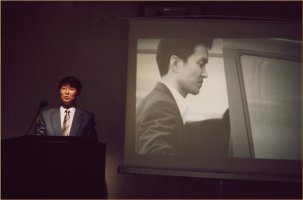 Han Suk-kyu is a North Korean intelligence officer Rim Byeong-ho, who defects to South Korea from East Berlin circa 1980. However, the Southern authorities suspect Rim of false defection and subject him to rounds of unspeakable torture. Asked why he escaped to the South, Rim mutters through torn and blood-encrusted lips, "To...to enjoy liberty." Hearing this, one of the interrogators snickers, "Liberty? There is no liberty in South Korea either, dumbass." These bureaucratic scourges know that preservation of the system is what the spy game is all about: neither revolution, nor justice, nor the unification of the "people split asunder" has anything to do with it in the end. The film explores this theme through its focus on one tough operative caught between two "fatherlands," which merely see him as a pawn in the grand game of chess, expendable and readily replaceable. Rim, in truth, is a North Korean spy. He withstands the torture and gains trust of the South Korean spooks. He hides his true loyalties, resists assimilation into the capitalist and pleasure-seeking South Korean culture. And yet when Rim meets his courier cum contact Yun-mi (Ko So-young), raised in South Korea as a spy almost from the day of her birth, his absolute faith in the Worker's Party begins to crumble. A pawn who learned to question his role as a pawn is no longer useful as a pawn, and must be eliminated.
Han Suk-kyu is a North Korean intelligence officer Rim Byeong-ho, who defects to South Korea from East Berlin circa 1980. However, the Southern authorities suspect Rim of false defection and subject him to rounds of unspeakable torture. Asked why he escaped to the South, Rim mutters through torn and blood-encrusted lips, "To...to enjoy liberty." Hearing this, one of the interrogators snickers, "Liberty? There is no liberty in South Korea either, dumbass." These bureaucratic scourges know that preservation of the system is what the spy game is all about: neither revolution, nor justice, nor the unification of the "people split asunder" has anything to do with it in the end. The film explores this theme through its focus on one tough operative caught between two "fatherlands," which merely see him as a pawn in the grand game of chess, expendable and readily replaceable. Rim, in truth, is a North Korean spy. He withstands the torture and gains trust of the South Korean spooks. He hides his true loyalties, resists assimilation into the capitalist and pleasure-seeking South Korean culture. And yet when Rim meets his courier cum contact Yun-mi (Ko So-young), raised in South Korea as a spy almost from the day of her birth, his absolute faith in the Worker's Party begins to crumble. A pawn who learned to question his role as a pawn is no longer useful as a pawn, and must be eliminated.
Double Agent is relentlessly somber in tone. Those who expect the charming tragi-comedy of The Spy Lee Chul-jin (1999) and the slick entertainment of Shiri (1999) will be particularly disappointed: there is one scene of hand-to-hand combat in the entire movie: there is virtually no humor. Those not familiar with recent Korean history may be completely sideswiped by a major subplot involving the framing of South Korean students in Berlin as Northern spies by the KCIA. The movie's biggest problem, however, is that Han Suk-kyu and Ko So-young have little chemistry together. Even though Han is as usual very believable in a difficult role, Ko is frankly miscast, unable to convey the combination of romantic fatalism and sharp awareness that her character is supposed to possess.
On the other hand, the movie's technical accomplishments are top-notch. From the title sequence that stunningly and seamlessly integrates Han Suk-kyu into the documentary footage of a North Korean military parade, to the impeccable production design of the drab KCIA offices and the dreadful torture chamber in Namsan, to Michael Staudacher's majestic music score, there is very little from the production end that can be called sloppy or indifferent. Greatly aided by these overachieving staff members, newcomer director Kim Hyeon-jeong does a fine job of orchestrating the potentially unwieldy plot mechanisms and diverse elements of the globe-spanning production into a coherent whole. The supporting cast provides an able support as well. Two standouts: Song Jae-ho, (who starred in the two top hit films of 1970s, Young-ja's Heyday [1975], Winter Woman [1977]: it is such a pleasure to see him again in no less than two movies this year), breathtakingly changes from a kindly, humanitarian doctor to an assassin who can coldly "liquidate" a witness in the blink of an eye. Cheon Ho-jin as the elite, dandy KCIA honcho is full of venom under the surface of a mellow, reasonable father figure.
More like a major Hollywood production starring Harrison Ford than a generic Korean film, Double Agent is too polished to be an art film, too serious-minded to be a fun picture. Whatever it may lose in entertainment value, however, it gains back in respect. I hope to see more political thrillers like Double Agent in the future, not necessarily about North-South relations, but about all aspects of the recent history of the Korean peninsula. There are so many compelling stories yet to be told on the silver screen. (Kyu Hyun Kim)
Perhaps no Korean film of recent years has had a greater commercial impact than the romantic comedy My Sassy Girl. Apart from its local success, it was the best-performing Korean film ever to open in Southeast Asia, and DreamWorks even bought up rights to produce a remake in the U.S. The film made instant stars of its leads Jeon Ji-hyun and Cha Tae-hyun, and My Sassy Girl remains the best-selling Korean DVD ever produced.
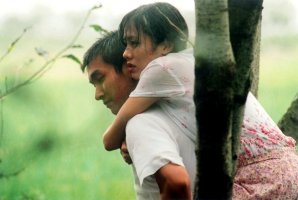 It would be unfair to expect director Kwak Jae-yong to catch lightning in a bottle yet again with his next feature The Classic, and fans of My Sassy Girl should keep their expectations in check when they watch it. Despite being sprinkled with bits of humor, The Classic adopts a far more traditional melodramatic mode than its predecessor. It tells the story of Ji-hye, a university student who discovers a secret box filled with old letters while her mother is traveling overseas. As she explores its contents, she comes to learn of her mother's first love affair, a story which closely parallels her own situation at the university.
It would be unfair to expect director Kwak Jae-yong to catch lightning in a bottle yet again with his next feature The Classic, and fans of My Sassy Girl should keep their expectations in check when they watch it. Despite being sprinkled with bits of humor, The Classic adopts a far more traditional melodramatic mode than its predecessor. It tells the story of Ji-hye, a university student who discovers a secret box filled with old letters while her mother is traveling overseas. As she explores its contents, she comes to learn of her mother's first love affair, a story which closely parallels her own situation at the university.
Told mostly in flashback, with actress Son Yeh-jin taking the roles of both Ji-hye and her mother Ju-hee, the film opens with a gorgeous-looking sequence shot in the country which strongly recalls the Korean novel and 1979 movie Rain Shower ("Sonagi", parodied in the film My Sassy Girl). Ju-hee, on a visit from Suwon, becomes acquainted with a boy her age named Jun-ha (Cho Seung-woo) who takes her downriver to a crumbling 'haunted' house. On their way back they lose their boat and are caught up in a rain shower, so that they return very late and Ju-hee is sent back to Suwon by her angry parents. Later, however, they become re-acquainted at high school, and a love triangle emerges between them and Jun-ha's best friend.
The film is quite long, and takes many more twists and turns as it jumps between past and present. Unfortunately the segment staged in the present day does not develop much emotional force, with Jo In-sung giving a particularly wooden performance as Ji-hye's love interest. The flashback scenes are much better, thanks in particular to period details, nice cinematography and the charismatic acting of Cho Seung-woo. Nonetheless, later on the director tries to stretch the plot into a Forrest Gump-style epic, striving for a unity at the end which, in all honesty, feels forced.
Echoes of My Sassy Girl are to be seen everywhere in this film, from the casting of minor characters (the old man under the tree, Jeon Ji-hyun's parents, etc.) to the music (Pachelbel's Canon in D) to various backdrops (trains, lots of rain). I couldn't help but feel disappointed with the end result, though. The film is weighed down by so many plot twists and scenes that are meant to both moving and surprising, that at the end one just feels relief that it has finally ground to a close. (Darcy Paquet)
(Trailer: 300k)
Adaptations of internet-based novels have become a new trend in Korean cinema, following the success of the famous My Sassy Girl in 2001. This year, another film based on an internet novel My Tutor Friend topped the box office for five consecutive weeks and ended up with more or less the same ticket sales as My Sassy Girl after screening for 2 1/2 months.
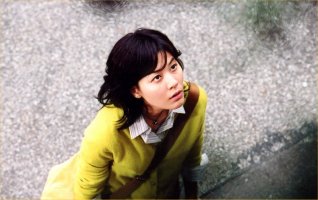 The film is based on a boy and girl who are the same age. Second year university student Soo-wan, who came from a poor family which owns a fried chicken shop, works as a private tutor to cover her expenses. One day she is assigned to tutor Ji-hoon, a high school boy from a rich family who cares more about his gangster business than his studies. Their lessons begin with many conflicts but end with love.
The film is based on a boy and girl who are the same age. Second year university student Soo-wan, who came from a poor family which owns a fried chicken shop, works as a private tutor to cover her expenses. One day she is assigned to tutor Ji-hoon, a high school boy from a rich family who cares more about his gangster business than his studies. Their lessons begin with many conflicts but end with love.
While the sucess of My Tutor Friend is great, it's a bit expected that people would compare it with My Sassy Girl, which may be a bit harsh for first time director and scriptwriter Kim Kyung-hyung. To some extent, it shares more or less the same rhytum as that of My Sassy Girl with a wild female character. Following the internet novel, the first two-thirds of the film focuses on the conflicts between the leading characters. While lots of distinct moments catch the audience's laughs, the film is condensed to fit in the different stages in the development of their relationship. Still, Kim has done more than can be expected of a first-time director.
Kim Ha-neul, who also acted as an university girl in her previous film Ditto, shows a totally different image and character. While her character may look a bit similar to her role in MBC's popular TV drama Romance, she offers a much more natural performance than ever before and proves her ability in differentiating characters that are more or less the same.
This film also tries to put a spotlight on Kwon Sang-woo. He had previously acted as a high school boy in both Volcano High and Make It Big!, but this is the first time for him to be in the leading role. With the strong role reserved for the female character, his role is pretty minor. Given that this is a character he had practice with before, he is sharp in the film and shows his potential to become one of the new stars in the coming years. (Ryan Law)
(Trailer: 300k)
Kim Bong-doo (Cha Seung-won) is a young teacher in a Seoul elementary school. Frequenting "room salons," guilelessly collecting bribes from the parents and openly discriminating against the students whose parents do not "pay dues," Kim is a rotten egg, a shame to his (much maligned) profession. When he becomes the target of parent complaints, Kim is temporarily bounced off to a branch school in a remote village in the Kangwon Province (the number of registered students: five!). Driven to near insanity by boredom and peace, Kim decides to persuade his students to transfer to Seoul, thus eliminating the branch school altogether. Of course, his scheme goes haywire as his efforts to encourage "special talents" of the students (i.e. scuttle academic instruction and play all day!) actually result in a happy, supportive environment for the kids and the village community.
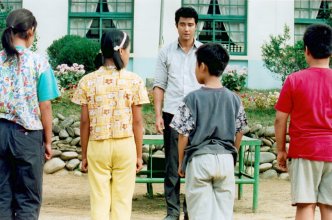 I am a fan of Cha Seung-won, even though I am admittedly still working on why I like him. The Korean film industry seems to typecast him as a comedic actor of limited range, and his choice of films in recent years (Kick the Moon, Jail Breakers, the present film and the upcoming Ghost House) reinforces that image. And yet I keep expecting him to tear open his poker face to show something different, channeling the depth of emotion and complexity of personas swirling underneath the impeccable aw-shucks comic timing. Maybe I still remain impressed with his performance as the pyromaniac in Libera Me. There is something about the way Cha holds his tall (he stands out like a giraffe among any normal group of Koreans) frame, and the way his face reacts to the goings-on around him, with his mouth half-open, eyes at once childlike and sly, head tilted forward as if he is about knock himself silly on an invisible wall, that reminds me of a young Bill Murray.
I am a fan of Cha Seung-won, even though I am admittedly still working on why I like him. The Korean film industry seems to typecast him as a comedic actor of limited range, and his choice of films in recent years (Kick the Moon, Jail Breakers, the present film and the upcoming Ghost House) reinforces that image. And yet I keep expecting him to tear open his poker face to show something different, channeling the depth of emotion and complexity of personas swirling underneath the impeccable aw-shucks comic timing. Maybe I still remain impressed with his performance as the pyromaniac in Libera Me. There is something about the way Cha holds his tall (he stands out like a giraffe among any normal group of Koreans) frame, and the way his face reacts to the goings-on around him, with his mouth half-open, eyes at once childlike and sly, head tilted forward as if he is about knock himself silly on an invisible wall, that reminds me of a young Bill Murray.
Cha Seung-won hardly does anything obvious: even when he plays an idiot (as in Break Out), as an actor he is constantly surprising. Cha chooses to play the key emotional ("three handkerchief") scenes in My Teacher, which are mercifully not many, subtle and subdued. He is absolutely hilarious when called for, but he can also be quietly moving, as in a scene where Kim, out of unbearable guilt, gets angry toward his ailing father over the phone.
Director and writer Jang Kyu-seong (Funny Movie), filming Seoul schools and hospitals in deliberatively (?) ugly pastel colors and keeping the Kangwon-do mount-scapes intimately, inclusively deep-green, shows good sense in keeping the comedy mellow and the characterizations crisp. He gets excellent support from the veteran Byeon Hee-bong (Memories of Murder, Barking Dogs Never Bite) and Seong Ji-ru (unforgettable in A Good Lawyer's Wife). Byeon's interactions with Cha are particularly effective, a lesson in how to render crusty characters with much surface antagonism between them essentially likable (It is a nice touch that Byeon's Mr. Choe, whose initial value to Teacher Kim is that he has access to imported cigarettes, has the final line of the movie rather than the children). Indeed, the integrity of Kim's character is not sacrificed even in the manipulative climax, the graduation ceremony.
My Teacher Mr. Kim is a pleasantly level-headed comedy that goes to the opposite direction from, say, The Way Home, despite superficial similarities. Had this film been made in the late 1990s instead of 2003, its direction would have veered off toward serious social criticism, probably with a goodly chunk of heavy-handed melodramatics about Kim Bong-doo's transformation from a scoundrel into a conscientious teacher. Instead, the film portrays Teacher Kim, a flawed, hypocritical but ultimately sympathetic figure, with a refreshingly non-judgmental attitude, a good deal of compassion and a healthy dose of non-pushy wit and humor. (Kyu Hyun Kim)
Young director Jang Joon-hwan first drew notice in the Korean film industry for a 30-minute short he made in 1994 called 2001: Imagine. The film impressed a lot of people, and so when news surfaced that he was shooting his feature debut, it created a fair amount of expectation. Save the Green Planet also featured a plotline that promised something out of the ordinary, so that for critics and industry people (though sadly, not audiences in general) this film has been 'one to watch' ever since it started shooting.
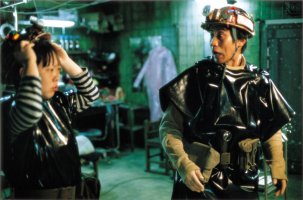 The hero of Save the Green Planet is a mentally-unbalanced young man on medication who believes that aliens are plotting an imminent assault on the planet Earth. After much research, mostly through viewing B-grade science fiction films and reading some very non-mainstream books, he determines that the head alien in charge of leading the invasion is already on earth, masquerading as the successful CEO of a large conglomerate. With the survival of humanity on the line, he and a sympathetic young tightrope walker from the circus take it on themselves to kidnap the man/alien in hopes of averting the invasion.
The hero of Save the Green Planet is a mentally-unbalanced young man on medication who believes that aliens are plotting an imminent assault on the planet Earth. After much research, mostly through viewing B-grade science fiction films and reading some very non-mainstream books, he determines that the head alien in charge of leading the invasion is already on earth, masquerading as the successful CEO of a large conglomerate. With the survival of humanity on the line, he and a sympathetic young tightrope walker from the circus take it on themselves to kidnap the man/alien in hopes of averting the invasion.
The narrative thrust of the film centers around the confinement of the man/alien in the basement of a rural home (a dark, nightmarish sort of place) and the efforts of rival groups of detectives to track down the kidnapper. As the film progresses and all those involved grow more desperate, viewers may find their sympathies pulled in odd directions. The hero, played by Shin Ha-kyun (in perhaps his best acting performance ever), resembles in many ways our typical downtrodden hero, but his impassioned and increasingly violent behavior makes us pull back in shock at times. The supporting cast, meanwhile, are among the film's great strengths, particularly an eccentric, disgraced detective played by Lee Jae-yong.
As for the directing, it appears that we can add a new name to the list of Korea's most distinctive and talented filmmakers. Jang Joon-hwan excels at the technical aspects of filmmaking, and is very good at controlling the film's emotions. His screenplay is also quite daring, showing little regard for either Hollywood narrative conventions or for playing it safe commercially.
Alas, Save the Green Planet bombed badly at the box-office, with most viewers opting for the warm humor of My Teacher, Mr. Kim or the glitz of Chicago to the dark imagery, depressing themes and seat-squirming violence offered up here (though a vocal minority praised the film highly). The film is more suited as a cult item, and audiences at fantasy film festivals around the world are certain to go crazy over it.
Maybe it was my mood when I watched it, given the wars and pestilence which crowd the news wires these days, but I could hardly speak for close to half an hour after this movie ended. More than anything else, it's extremely sad, and it hit me in a vulnerable spot. This was the 12th Korean film released so far this year, and in my opinion it's worth more than all the other eleven combined. (Darcy Paquet)
(Trailer: 300k)
Nine-year-old Do-nyeom (Kim Tae-jin) is a boy-monk leading a quiet monastic life in one mountain temple, located somewhere in the Eastern seaboard. Do-nyeom has lived with the head priest (theater actor Oh Young-soo) as long as he remembers, and currently shares his room with a twentysomething novice Jeong-shim (Kim Min-kyo). His greatest wish is to meet his own mother, who had apparently abandoned him in the temple. When a beautiful and rich lady (Kim Ye-ryung) visits the temple to perform funereal rites for her dead son, Do-nyeom fantasizes that perhaps she can adopt him as her new son.
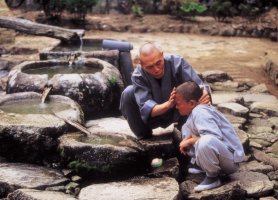 Nearly seven years were spent in completing A Little Monk. The production team seems to have suffered every imaginable form of financial difficulties that one can encounter in the course of low-budget, non-commercial moviemaking. At one point, director Joo Kyung-jung claims to have made 400 phone calls to raise mere 2,000 dollars, the lack of which had abruptly shut down the entire production. The actual lensing took only 27 days, but the schedule was so widely spread out over the years that the child-actor Kim Tae-jin physically grew up, threatening the film's narrative continuity. (This is somewhat noticeable in the finished movie) Despite these mind-boggling setbacks, A Little Monk was successfully completed and proceeded to charm audiences in the international festival circuit, receiving much praise in Shanghai, Chicago and Berlin, among other sites. Its domestic box office returns were also not bad, although the film fell short of replicating the phenomenal success of The Way Home, as some industry observers had speculated.
Nearly seven years were spent in completing A Little Monk. The production team seems to have suffered every imaginable form of financial difficulties that one can encounter in the course of low-budget, non-commercial moviemaking. At one point, director Joo Kyung-jung claims to have made 400 phone calls to raise mere 2,000 dollars, the lack of which had abruptly shut down the entire production. The actual lensing took only 27 days, but the schedule was so widely spread out over the years that the child-actor Kim Tae-jin physically grew up, threatening the film's narrative continuity. (This is somewhat noticeable in the finished movie) Despite these mind-boggling setbacks, A Little Monk was successfully completed and proceeded to charm audiences in the international festival circuit, receiving much praise in Shanghai, Chicago and Berlin, among other sites. Its domestic box office returns were also not bad, although the film fell short of replicating the phenomenal success of The Way Home, as some industry observers had speculated.
A Little Monk is a little too sweet at times, but is a very honorable effort. One of the posters used in South Korea makes it look as if it is a raunchy comedy, a sort of Hi, Dharma meets Sex is Zero. Well, one subplot involving Joeng-shim's desire to have his, ahem, manhood properly circumcised, is indeed funny. Otherwise this ad campaign is pretty misleading. Beautifully photographed in various locations, including Seon-am-sa Temple in the Taebaek Mountains and the city of Yeosu, highlighting gentle, warm greens of the mountain forests, A Little Monk is actually a sincere Buddhist parable. Do-nyeom's quest for a mother figure is paralleled by Jeong-shim's efforts to overcome his "attachment" to the world of flesh, specifically painful memories of the love lost. Their faith demands that they renounce the world of flesh and realize its illusory nature, and yet the movie focuses on their weaknesses, their inability to do so. Even the head priest's faith, when it turns disciplinarian and absolutist, may in the end be a form of attachment, blocking the path toward his own enlightenment. Poor Do-nyeom's plight does tug at our heartstrings, but director and scenarist Joo (who adapted the movie from a play by Han Se-deok, reportedly much more religious in overtones) refuses to opt for an easy emotional catharsis. The Buddhist koan interspersed throughout the film are not just clever dialogues, either: they do carry weights of genuine reflections on the human suffering and meaning of life, as in the scene where the head priest asks Do-nyeom whether a boulder he sees in his favorite spot is inside or outside his heart. Overwhelmed by sadness and longing for his mother, Do-nyeom returns to the temple and answers that the boulder is outside his heart: the head priest then retorts, "If it is outside your heart, then why are your steps so heavy?"
A Little Monk is compassionate, honest, and most importantly, made with conviction. In its own modest way, this labor of love can claim a position in the distinguished lineage of Buddhist-themed cinema from South Korea, such as Im Kwon-taek's Mandala (1981) and Bae Yong-gyun's Why Did Bodhi-Dharma Leave for the East? (1989) (Kyu Hyun Kim)
(Trailer: 300k)
Oh! Happy Day is a My Sassy Girl (2000) retread, with Jang Na-ra as both "The Girl" and Gyun-woo rolled into one, trampling and squashing other characters like a Macarena-dancing Godzilla. Let me put it plain and clear at the outset: if you are not a big fan of Jang Na-ra, you have basically no reason to watch this film.
Jang plays Hee-jee, a borderline psychotic (I know, I know, it is not supposed to be like that, but... she is borderline psychotic) voice-actress who flips her lid when the application from her friends for a Club Med-sponsored dating trip is rejected. Storming into the Club Med office, she is totally smitten by its snooty junior executive Hyun-jun (Pak Jeong-cheol). She pursues him relentlessly, sabotaging his resort development project, blackmailing him to a dinner in a posh restaurant, etc. And of course, Hyun-jun reciprocates her stalking and harassment by falling in love with her and dumping his own beautiful girlfriend, and everybody lives happily ever after. What, did you expect Thomas Hardy or something?
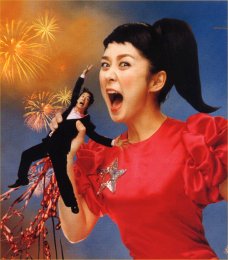 I am the first person to admit that the charms of My Sassy Girl are lost on me, but I can at least make sense why young Koreans suckled on CF, internet surfing and TV variety shows might find it likeable. However, other Korean "comedies" baked in the Sassy Girl mold are becoming so bizarrely unfunny that I sometimes feel like I am watching avant-garde butoh pieces performed in Urdu. Oh! Happy Day is a case in point.
I am the first person to admit that the charms of My Sassy Girl are lost on me, but I can at least make sense why young Koreans suckled on CF, internet surfing and TV variety shows might find it likeable. However, other Korean "comedies" baked in the Sassy Girl mold are becoming so bizarrely unfunny that I sometimes feel like I am watching avant-garde butoh pieces performed in Urdu. Oh! Happy Day is a case in point.
"Characters" in this movie are like live figures adapted from a particularly grating Japanese anime. Most of the times, Hee-jee looks and acts like a mongoose about to bite off the head of a king cobra. "Charming" or "cute" is not exactly the adjective that jumps to one's mind. Her love interest, Hyun-jun, is, pardon my extreme expression, a complete idiot. A Club Med hotshot... right, if I were a Club Med executive I would sue this movie for defamation. In fact, most of the "characters" in this movie behave like Teletubbies who swallowed several jars of methamphetamine. When they are not choking and beating the stuffing out of each other, they scream, jerk around and make faces like wind-up toys with broken springs (with the "sound effects" that go "Boing!" "Kaboing!" in the background).
There are glimmers of creativity in a few scenes where director and screenwriter Yun Hang-ryeol seems to tweak overripe melodramatic conventions, although the execution is so inane it is difficult to tell. For instance, Hee-jee collapses in bathroom, but her "critical condition" turns out to be hemorrhoids. The idea itself is funny, I concede, as a parody of the illness that always afflicts the heroine in Korean melodramas. Then, I knew that since the word "hemorrhoid" is mentioned, and given the nature of this film, there would be at least one anal orifice joke. And sure enough, Hee-jee's mother (Kim Hae-suk) barges into the hospital and berates Hee-jee for abusing her anal orifice. In fact, Mom mentions that particular anatomical component about six times in that one spurt of dialogue. Oh~ ~ what sophistication! What insouciance!
By the way, the film, like so many other "romantic comedies" among Korean TV dramas and cinema, is pretty hypocritical. It capitulates to the snobbish elitism and fetishistic worship of class privileges that it purports to criticize: a US-educated, English-speaking, jet-set, gym-frequenting twentysomething guy, most importantly loaded with cash, is, after all, the most desirable "honey" for the protagonist. True love sells in Korea... when it also means ensnaring a fantasy upper-crust spouse.
But why complain? It is an "entertainment machine" designed to show off Jang Na-ra in all her face-contorting glory, and you should have known that when you paid your seven bucks. Just so that you will have a proper chance to get engorged on Miss Jang, you get her treacly song on the soundtrack and a musical number finale where all cast numbers come out and dance. At least Oh! Happy Day is not pretentious or self-important. In the last analysis, it is a harmless (except perhaps to your brain cells) star vehicle for Jang. I find myself immune to her radiant energy, but don't let that deter you: nonetheless, don't forget to bring a lead helmet to protect your brainpan, just in case. (Kyu Hyun Kim)
(Trailer: 300k)
A soft-spoken, fastidious graduate student Won-sang (Pak Hae-il, Waikiki Brothers) goes through a bad break-up with his girlfriend. He gets a job at a small but prestigious literary magazine, and is attracted to the magazine's part-time photographer, a permanently disheveled but freewheeling veterinarian Seong-yeon (Bae Jong-ok). To his consternation, however, he finds out that his boss Han Yun-sik (Moon Seong-keun, Green Fish, Virgin Stripped Bare by Her Bachelors), the outspoken, charismatic and womanizing editor-in-chief, was responsible for snatching his girlfriend away. Han has now set his eyes on Seong-yeon. Won-sang tries to drive a wedge between the two, but in the process, his relationships with both Yun-sik and Seong-yeon grow more and more intricate. Meanwhile, Won-sang becomes an object of clumsy courtship by his young landlady, Hye-ok (Seo Yeong-hee), who is frightened that the allegedly hereditary mental illness in her family will claim her.
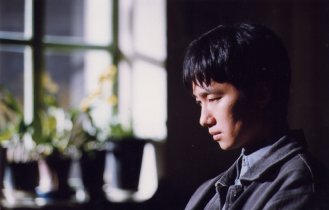 Upon its release, Jealousy was instantly compared to Hong Sangsoo films by the Korean critics. They pointed to meticulous observations of the everyday minutiae, naturalistic performances of the actors, restrained editing and camera movement and other common features. While these similarities do exist, in tone and in characterization Jealousy is as different from Hong's films as John Cassavettes is from Ingmar Bergman. First-time director Pak Chan-ok (not to be confused with Pak Chan-wook, the director of JSA) chooses to gradually reveal the character's inner colors by piling up vignettes upon one another. The film's narrative is nowhere nearly as tightly designed as a Hong Sangsoo film. The engine of the narrative is its characters, all seemingly "normal" people but always slightly on the edge, as if trying to prevent by ignoring sudden outbursts of frustrated emotions. The movie treads the middle ground between the naturalistic "slice of life" observations one the one hand, and a drama tracing the arc of the relationships on the other.
Upon its release, Jealousy was instantly compared to Hong Sangsoo films by the Korean critics. They pointed to meticulous observations of the everyday minutiae, naturalistic performances of the actors, restrained editing and camera movement and other common features. While these similarities do exist, in tone and in characterization Jealousy is as different from Hong's films as John Cassavettes is from Ingmar Bergman. First-time director Pak Chan-ok (not to be confused with Pak Chan-wook, the director of JSA) chooses to gradually reveal the character's inner colors by piling up vignettes upon one another. The film's narrative is nowhere nearly as tightly designed as a Hong Sangsoo film. The engine of the narrative is its characters, all seemingly "normal" people but always slightly on the edge, as if trying to prevent by ignoring sudden outbursts of frustrated emotions. The movie treads the middle ground between the naturalistic "slice of life" observations one the one hand, and a drama tracing the arc of the relationships on the other.
Jealousy is a good film, but not an entirely satisfying one. We gain much insight into what makes the characters tick (other than Won-sang), but we are not told why we should bother caring about them (or despising them, as in a Hong Sangsoo film). The fact that the erstwhile protagonist of the movie, Won-sang, is nothing more than a suggestive blank may appeal to some sensibilities, but it is a source of frustration for me. What makes him attracted to Seong-yeon, for example? Why does he want her not to make love to Yun-sik? Is it out of sheer jealousy and is he in fact using Seong-yeon? Or does he genuinely care about her? It is difficult to tell. Frankly, I am still not sure whether the film's title, Jealousy Is My Middle Name (or the Korean title, "Jealousy Empowers Me") is meant to be taken literally or as an ironic statement. Won-sang's behavior seems hardly motivated by any real emotion, much less jealousy. Casting of Pak Hae-il as Won-sang for me strengthens this impression, with his feminine-handsome noh mask face, although one cannot certainly fault his performance.
Interestingly, Jealousy can be interpreted as really about the homosocial relationship between Won-sang and Yun-sik, with women playing supporting roles, who in effect bring the two men closer to one another (a la Eve Sedgwick's Between Men). As the film progresses, Won-sang becomes, for all intents and purposes, Yun-sik's "girlfriend" (or "lover" if you prefer), except that they do not actually engage in sex.
For me, the film's main pleasures are derived from watching Moon Seong-keun essay the role of Yun-sik, one of the most interesting male characters in recent Korean cinema. To be sure, Moon is a riveting presence in any film he is in. He is like what Woody Allen might have become had he grown up with the face and body of, say, Daniel Day-Lewis: smart, charming, neurotic or dangerous, or all at once if called for. Yun-sik is an uncommonly well-written role that allows Moon to present different facets of the character, his intelligence, confidence, callousness and vulnerability, without compromising the empathy of the audience.
The film also contains many moments of insight into human condition, some of them quite touching. For instance, Yun-sik gently but decisively rejects his father-in-law's well-intentioned advice that he stops fooling around behind his daughter's back, only to regret his stubbornness later. Moon's performances in these scenes, as well as the restrained, unforced way these episodes unfold, create exquisite emotional effects.
All in all, Jealousy marks an auspicious debut for Director Pak, who adds her name to the increasing number of talented women directors in Korea. (Kyu Hyun Kim)
(Trailer: 300k)
Between the years of 1986 and 1991, a small village in Korea's Gyeonggi Province was witness to the rape and murder of 10 women, all in the same groteque and brutal manner. Korea had never before experienced serial murders of this kind, and an intense media frenzy and police investigation followed. As the murders continued to take place over the years, investigators grew more desperate, at one point even consulting a shaman who advised them to move the gate of the police station to a more favorable location (which they did, to no avail). Ultimately all their efforts would be in vain, and to this day nobody knows who the murderer was or whether he is still alive.
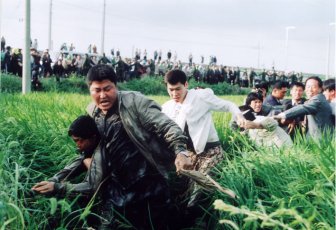 In 1996, the poignant memories of this incident were reshaped into a successful stage play directed by Kim Kwang-rim. The dramatic intensity of the story attracted the interest of several filmmakers who wished to make a film of the material, but ultimately it would be Bong Joon Ho, the talented director who debuted in 2000 with Barking Dogs Never Bite, who would be charged with the task. Bong took the stage play and, consulting historical documents, wrote a screenplay focusing on two of the police investigators. Bong's primary addition to the material was to highlight the era in which the murders took place -- a time in which the Korean populace was struggling to shake off its authoritarian and militaristic past.
In 1996, the poignant memories of this incident were reshaped into a successful stage play directed by Kim Kwang-rim. The dramatic intensity of the story attracted the interest of several filmmakers who wished to make a film of the material, but ultimately it would be Bong Joon Ho, the talented director who debuted in 2000 with Barking Dogs Never Bite, who would be charged with the task. Bong took the stage play and, consulting historical documents, wrote a screenplay focusing on two of the police investigators. Bong's primary addition to the material was to highlight the era in which the murders took place -- a time in which the Korean populace was struggling to shake off its authoritarian and militaristic past.
The end result is perhaps Korea's biggest event film since Joint Security Area, a masterfully directed, superbly acted film which is at turns blackly humorous, thought-provoking, and horrifying. The film stars top actor Song Kang-ho (JSA) and Kim Sang-kyung (Turning Gate) as two investigators, the former a local policeman and the latter a detective who comes from Seoul to assist in the case. The first part of the film focuses on the two men's characters and the rivalry that builds between them. As time passes, however, the narrative becomes more complex, as our leads begin to transform under pressure and as we see references to the social situation in Korea at the time, when the government was too busy suppressing its own citizens to put resources into a proper investigation.
Although this movie features one of the best performances ever from Song Kang-ho, one of Korea's most talented actors, the film's amazing ensemble cast almost succeeds in stealing his spotlight. Minor characters such as the old police chief (played by Byun Hee-bong), the slightly retarded Baek Kwang-ho (played by theatre actor Park No-shik, who now has his own fan club), violent investigator Yong-gu (Kim Rae-ha, in his most prominent role to date), Song Kang-ho's girlfriend Sul-young (played by Jeon Mi-seon, who was Han Suk-kyu's old flame in Christmas in August) and the new police chief (Song Jae-ho, also in Double Agent) are only a few of the memorable characters created by this skilled cast. Park Hae-il from Jealousy Is My Middle Name also takes a role towards the end of the film that is sure to stay in the memory of viewers.
Another impressive aspect of this film are its visuals. The production set a record for using the most locations in any Korean film to date, in an effort to recreate the underdeveloped rural landscape of the mid-80s. Director of photography Kim Hyung-gu (who also shot Musa, One Fine Spring Day and Chen Kaige's Together) creates striking images out of ordinary objects, with earthy browns and yellows painting an unforgettable portrait of small town life.
Recently, many critics have begun saying that Korean audiences no longer appreciate good films, that they prefer instead the light comedies that have dominated the box-office over the past couple years. The smashing popular success of Memories of Murder now acts as a counterweight to that argument, signalling that ambitious, serious, well-made productions in Korea still have potential if they can capture the imaginations of ordinary viewers. (Darcy Paquet)
(Trailer: 300k)
Having opened against the monster hit Memories of Murder and the Hollywood juggernaut X-Men 2, Mr. Butterfly did not-too-bad business with more than 600 thousand tickets sold nationwide, but was almost universally panned by the critics. Later, the film created a mini-controversy when it was invited to be screened at the Critics Week for the Venice International Film Festival, accompanied by the official selection A Good Lawyer's Wife. It is not difficult to see why this movie left Korean critics and a sizable number of viewers irritated and dissatisfied. And yet, I find myself on the defensive side of the fence as far as its merits are concerned, despite its many flaws. Turns out that those European critics had some points after all.
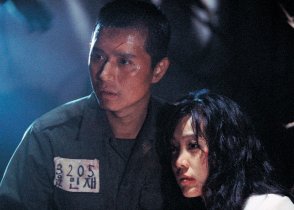 Min-jae (Kim Min-jong), like thousands of young country folks in 1970s Korea, dreams of making it big in Seoul. He ventures out to Seoul, leaving behind the tearful Eun-ji (Kim Jeong-eun), his village sweetheart. They swear upon their eternal love by engraving identical butterfly tattoos on their chests. Years later, Min-jae has become a thug and a gigolo, swindling money out of rich housewives for a living. One day he runs into Eun-ji, equally despoiled by Seoul and now a mistress of Colonel Heo (Doggo Yeong-jae), a shady military character with a sadistic streak. Despite dire warnings from Colonel Heo, they rekindle their old romance. However, when the Chun Doo Hwan dictatorship initiates in 1980 the so-called Samcheong Re-education Program, Colonel Heo finds a perfect, legal means to annihilate Min-jae.
Min-jae (Kim Min-jong), like thousands of young country folks in 1970s Korea, dreams of making it big in Seoul. He ventures out to Seoul, leaving behind the tearful Eun-ji (Kim Jeong-eun), his village sweetheart. They swear upon their eternal love by engraving identical butterfly tattoos on their chests. Years later, Min-jae has become a thug and a gigolo, swindling money out of rich housewives for a living. One day he runs into Eun-ji, equally despoiled by Seoul and now a mistress of Colonel Heo (Doggo Yeong-jae), a shady military character with a sadistic streak. Despite dire warnings from Colonel Heo, they rekindle their old romance. However, when the Chun Doo Hwan dictatorship initiates in 1980 the so-called Samcheong Re-education Program, Colonel Heo finds a perfect, legal means to annihilate Min-jae.
The melodramatic formulae that run through Mr. Butterfly are shamelessly uninventive. All major characters seemingly meet through chance encounters: in a church, Eun-ji tearfully thanks God for reuniting her with her old sweetheart, and swoons into the pew: copious amounts of tears are shed while the lovers ask one another, "Forgive me," "No, forgive me!" : A fatally wounded character patiently waits for another character to finish his warbles and pleas, and then dies (They never die in the middle of a sentence, do they?): The flashback in slow motion kindly "recaps" the highlights among the character's love scenes for the benefit of the audience. Let's see, did I miss anything? Oh yes, there are two minor characters who initially hate each other's guts, only to find out that they are actually in-laws (This despite the fact that these two gentlemen are from different provinces).
By all rights, Mr. Butterfly ought to be a laugh riot for wrong reasons, or the kind of mothball-smelling retro-'70s melodrama that might impress Aunt Yeonsogguk, you know, one who had been addicted to TV soaps for last 30 years. Then, why is it so compulsively watchable?
First of all, Kim Min-jong and Kim Jeong-eun actually make a compelling couple. These two actors would not be anyone's first choice to play romantic leads. Kim Min-jong plays against the role as written in the screenplay, which suggests a romantic tough guy in the Choi Min-soo-Sylvester Stallone mold: Min-jae as interpreted by Kim is instead a soft-spoken weasel, handsome but thoroughly "uncool." This precludes any possibility of Min-jae strutting himself like a horny steed in big love scenes, which would have pushed the film right into the nitrous oxide territory. Kim Jeong-eun, marketed as a comedienne, is quite good as a woman whose "romantic" yearning is an expression of defiance against the cruel fate dealt her. Theater-trained supporting players Lee Mun-sik (Hi Dharma, Break Out), Kim Seung-wook and Uhm Chun-bae also bring pathos and conviction to the roles basically designed as comic reliefs and broad caricatures.
I expected an abrupt tonal shift when Min-jae is thrown into the notorious Samcheong labor camps, but the gruesome camp sequences are surprisingly well integrated into the movie. Despite occasional interjections of the MTV aesthetic that threatens to prettify the hideous human rights abuses, the characters look genuinely hopeless and pathetic. These sequences generate an odd sense of realism that permeates the earlier and later "romantic" cliches and endows them with a measure of dignity.
I would hesitate in calling Mr. Butterfly a successful film. It goes for a grandly romantic but stark denouement, a sort of Casablanca meets Midnight Cowboy feel, but director Kim Hyeon-seong succeeds only in demonstrating how the materials he is working with are beneath his skills as a visual technician. The excessive "action" sequences seem straight out of a Viet Nam War movie and only add to confusion. The worst offender is the character of Lieutenant Hwang (Lee Jong-won), a truly ill-conceived deus ex machina, who nearly derails the film in the latter half. Nonetheless, Mr. Butterfly somehow has the power to pull you into its narrative, not to mention a kind of weird hutzpah that keeps you riveted to the screen, suppressing your impulse to scoff at the unreconstructed cliches the movie seemingly takes so seriously. An interesting, if awkward and inharmonious, effort. (Kyu Hyun Kim)
(Trailer: 300k)
Oseam, based on a popular story by Jeong Chae-bong, generated a disappointing box office figure in May 2003, despite the high anticipation in some circles. Commercially speaking, it suffered from the bad fortune of having debuted only one week after the highly anticipated Korean release of Miyazaki Hayao's Princess Mononoke.
 The film does not try to disguise its deliberately "old-fashioned" look: this is the kind of animation wherein the background painting is clearly distinguishable from moving characters, and no eye-popping designs or super-realistic details call attention to themselves. A peeled potato in a scene simply looks like a white lump: no minutely "shadowed" contours are visible. Even colors are subdued and tender, except for the exuberantly red foliage strewn in early scenes. There are some spare but effective uses of CGI effects as well as interesting editing choices, such as a scene fading out in two steps (first the background, second the character, and then total blackness). Director Seong Baek-yeop, who started his career as an animation director for Warner Brothers (including the new Spider Man series) and Disney cartoons, and his team, including Director of Photography Mun Seong-cheol and Character Design Artist Hong Won-taek, clearly wanted to prioritize story and character development over technical razzle-dazzle, a laudable goal in itself.
The film does not try to disguise its deliberately "old-fashioned" look: this is the kind of animation wherein the background painting is clearly distinguishable from moving characters, and no eye-popping designs or super-realistic details call attention to themselves. A peeled potato in a scene simply looks like a white lump: no minutely "shadowed" contours are visible. Even colors are subdued and tender, except for the exuberantly red foliage strewn in early scenes. There are some spare but effective uses of CGI effects as well as interesting editing choices, such as a scene fading out in two steps (first the background, second the character, and then total blackness). Director Seong Baek-yeop, who started his career as an animation director for Warner Brothers (including the new Spider Man series) and Disney cartoons, and his team, including Director of Photography Mun Seong-cheol and Character Design Artist Hong Won-taek, clearly wanted to prioritize story and character development over technical razzle-dazzle, a laudable goal in itself.
I almost feel like an Ama-no-jaku for not having liked this obviously heartfelt animation film, but I must confess that I found Oseam redolent of those polite, squeaky-clean Masterpiece Theater literary adaptations, mostly good for quashing any desire in the viewer's minds to further check out the originals.
The film is at heart a Buddhist fable, one of the strongest sub-genres in the "art-house" end of Korean cinema, and it is moderately interesting from that vintage point. The five-year-old protagonist Kilson is an innocent who is able to reach the enlightenment that eludes the adult devotees. Kilson communicates with the motherly portrait of the Avalokite Boddhisatva, and his pure heart moves Heaven, resulting in the divine manifestation of the Boddhisatva. Transference of the yearning for the lost mother into that for the Buddhist enlightenment is a theme also explored in A Little Monk. However, unlike the open-ended resolution of the latter film, Oseam resorts to a rather embarrassingly literal, almost tacky, presentation of a "miracle." One of the film's strengths, its philosophical and poetic dialogue, is also likely to lose some of its power when rendered as English subtitles.
Oseam is a genteel, well-intentioned film that is unfortunately not very compelling. It is mainly recommended for young children, for whom Kilson or his sister Gami may be a good identification figure, those adults absolutely sick of the violence, sex and lack of "values" in the contemporary cinema, and want to enjoy an evening with a classic children's story, told in a well-behaved, classic manner, and perhaps those who want to learn Korean language without having to suffer sensory assaults, follow Pretzel-like plots or listen to reams and reams of four-letter words. Those who are in the lookout for another Sprigun or even another Spirited Away are advised to stay away. (Kyu Hyun Kim)
(Trailer: 300k)
A super-terrorist Kang Ki-taek (Pak Sang-min, star of the Son of the General series) is planning to hijack a Seoul subway line. A maverick cop Jang Do-joon (Kim Seok-hoon, Legend of the Gingko) is apparently the only one in the entire Seoul police department who is onto Kang's crackpot scheme. It just so happens that Kang is also responsible for the death of Jang's wife, and for turning the latter into such an all-round swaggering bastard with a permanent five-o'clock shadow. Evil, isn't he? In-gyung, (Bae Doo-na, Saving My Hubby, Take Care of My Cat) an adorable pickpocket who has been in love with Detective Jang, is Kang's hostage No. 1. Can Detective Jang save the passengers' lives, consummate his revenge, and most importantly, open his eyes to In-gyung's true love for him, dammit, before everything blows up to kingdom come?
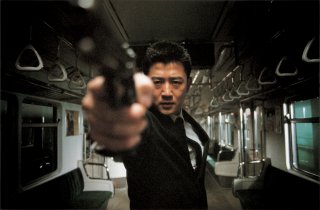 After the pre-credit sequence in which Kang's gang and the cops engage in a long, long, long shootout at the Kimpo Airport, blasting off hundreds, possibly thousands, of rounds with M-16 and other assault weapons, I seriously considered calling it quits. I felt in my gut this was going to be a replay of my less-than-happy encounters with 2009 Lost Memories, R U Ready and Yesterday. Well, I wish I could report that the movie was a pleasant surprise. It wasn't, but neither was it worse than any of the so-called "copywood" blockbusters, if that's any solace.
After the pre-credit sequence in which Kang's gang and the cops engage in a long, long, long shootout at the Kimpo Airport, blasting off hundreds, possibly thousands, of rounds with M-16 and other assault weapons, I seriously considered calling it quits. I felt in my gut this was going to be a replay of my less-than-happy encounters with 2009 Lost Memories, R U Ready and Yesterday. Well, I wish I could report that the movie was a pleasant surprise. It wasn't, but neither was it worse than any of the so-called "copywood" blockbusters, if that's any solace.
The plot, characters and direction are all exhaustingly self-important or thuddingly familiar. Even among the overblown blockbusters, Tube is notable for its misuse of the lead actors. Pak Sang-min's Kang, looking like a compact Song Kang-ho, seems to have flown in from an unrelated jopok/yakuza film (he has a wicked-looking sword strapped to his back, and at one point cuts off a character's pinkie). Kim Seok-hoon acts with his right eyebrow: when the character is cocky, the eyebrow is up. When he is not so cocky, it is down. And poor Bae Doo-na, blatantly miscast, is stuck in a role that would make Julianne Moore's ditzy nature photographer in The Lost World Shakespearean by comparison.
Nearly every shot in this movie looks like a car commercial, with that trendy blue-gray, gleaming-chrome look that gets tiresome fast. Director Baek Woon-hak, like quite a few Korean directors making their debut films, is technically proficient, but overdosed on the "cool" factor and obsessed with weepy "romantic" conventions. Even though he admitted that Tube was "inspired" by Speed, the film is at its core a riff on Shiri, which explains the interminable, tear-drenched denouement that could possibly strike non-Korean viewers as bizarre.
On the positive side, the CGI effects and the meticulously constructed sets are indeed impressive. Explosions are startling in their realism: the shots of speeding train look fantastic. Structure-wise, the film somewhat improves after the one-hour point, when the "action" becomes confined to the inside of the hijacked tramcar and the subway control room, and as such all the MTV-slow-motion nonsense are reduced to the minimum. In the control room, veteran supporting players including Im Hyeon-sik (YMCA Baseball Team), Ki Joo-bong (JSA, etc. ad infinitum) and Son Byeong-ho (Failan, Oasis) try gamely to inject some emotional realism, sorely lacking between the star couple, into the proceedings.
I suppose it is possible to enjoy Tube based on the merit of its technical accomplishments, but sorry, I just couldn't. In any case, given the lackluster domestic box office performance of Tube and other "Korean-style blockbusters" in the last two years, it may be that the days of Korean producers pouring hundreds of millions of won into the "copywood" formulae are numbered. (Kyu Hyun Kim)
(Trailer: 300k)
Dear Editor: Hello there, it is so nice to correspond with you. I am briefly taking over from our mutual associate Professor Kim, who is at this moment, shall I say, indisposed. It is all my fault, really: I was kibitzing like Martha Stewart crashing a church bazaar, until his fuse went out and he bellowed at me, "Why don't you write one!" Well, did he think that I would back down from a delicious challenge like that?
Ah, forgive my distracting digressions, I shall get right down to the point. A Tale of Two Sisters is a work of art. Yes, Jeff Koons can have an ivory statue of Michael Jackson and his chimp carved and painted, and call it a work of art. A Tale of Two Sisters is a real work of art, I am sure you know what I mean.
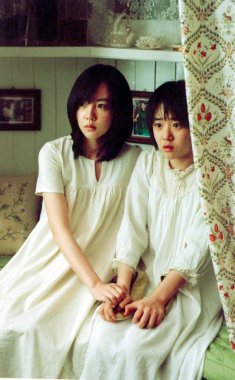 Surely A Tale of Two Sisters is the most beautiful Korean film made in the last three years, if not ever. Professor Kim insists that One Fine Spring Day and Sympathy for Mr. Vengeance (Oh horrors!) are equally or more beautiful: I say he needs a new pair of contact lenses. Time and again my eyes would just tear up from taking in so much visual pleasure: you could stare at intricate, hypnotic wallpaper patterns or creases in the odd-colored curtains for minutes and would not be bored. Technical aspects are superb, brilliant, I am running out of superlatives: costume design, set design, cinematography, lighting, all absolutely distinctive and exquisitely orchestrated. Ah, we shan't forget the evocative music score, especially that sorrowful waltz.
Surely A Tale of Two Sisters is the most beautiful Korean film made in the last three years, if not ever. Professor Kim insists that One Fine Spring Day and Sympathy for Mr. Vengeance (Oh horrors!) are equally or more beautiful: I say he needs a new pair of contact lenses. Time and again my eyes would just tear up from taking in so much visual pleasure: you could stare at intricate, hypnotic wallpaper patterns or creases in the odd-colored curtains for minutes and would not be bored. Technical aspects are superb, brilliant, I am running out of superlatives: costume design, set design, cinematography, lighting, all absolutely distinctive and exquisitely orchestrated. Ah, we shan't forget the evocative music score, especially that sorrowful waltz.
And acting! Those darling young actresses playing the teenage sisters, Im Su-jeong (Su-mi) and Mun Keun-yeong (Su-yeon), are not anorexic, skinny-nosed fashion model types. I approve! Im projects the sullen defiance of a precocious teenager, but effortlessly expresses her inner pain and confusion when needed. My heart just aches watching Mun's emotionally battered, retreating looks. From the moment Yeom Jeong-ah (H, Tell Me Something) playing the wicked stepmother enters the scene, doing that amazing slide-on-your-heels walk and spurting out dialogues in a mock-cheerful, scrumptiously malicious tone, she commands my rapt attention. I am a little disappointed that the film does not end with her bone-freezing cackle (Ooh, delicious shudders!).
What, you ask whether the movie is scary? Does Arnold Schwarzenegger have pectoral muscles? Just check out The Girl Under the Kitchen Sink, why don't you! Eeeek!
I heard there was much grumbling in the internet, et cetera, about the plot and "surprise ending" not making sense. If anything, I think the film errs in trying to explain too much. It ambitiously attempts to juggle three climactic revelations: Climax 1, where some characters are shown to be not quite what they are, Climax 2, a sequence involving the stepmother and that darned closet, and Climax 3, where the origins of the psychological trauma for the protagonist are revealed. Not to make a too fine point about it, after Climax 1, the final part of the film feels like an extended epilogue, when it should have come to a close with a bang. Having these many multiple endings also inevitably creates dissonance in the movie's world-view. The audience is likely to remain confused whether anything genuinely supernatural was responsible for the proceedings.
With this film, Director Kim Jee-woon in my humble opinion has proven himself to be a world-class filmmaker in his own right, so I only wish he had the self-restraint to resist being too greedy, like that... gross... gentleman in that scandalous Monty Python movie who must have a mint julep for a dessert when we all know he shouldn't. I really do think if he excised Climax No. 2 altogether, pruned Climax No.3, and brought the film under one hour and forty minutes, we would have had an uncontested masterpiece in our hands.
But why, even Aunt Liz's 14-karat diamond ring has a flaw in it. I think Two Sisters is in fact Kim Jee-woon's best film so far (Professor Kim is shouting that The Foul King is still better. My lord, those pro-wrestling shenanigans over this disturbing and achingly sad, almost innocently erotic fairy tale? Talk about perversity of academics!). Oh, let Hideo Nakata or Miike Takashi or one of those gentlemen go ahead and make something as refined and touching as Two Sisters. Really, let them try.
Well, I must say I really do hope that this gem of a motion picture is widely seen and appreciated in the world: I am so glad that it proved a match for that glorified sunglass commercial Matrix Rebooted (No? Reloaded? As if I care!) at the domestic box office. Gotta go now, I forgot to tell you that I have locked Professor Kim in the closet, and I better let him out before... something happens. Do forgive me for my manners, or lack thereof.
Happy viewing and re-viewing now!
Signed, Yours Truly, Yuhn Myikuk
(Trailer: 300k)
Pretty and shy Na Nan (Chang Jin-young, The Foul King, Sorum) is soon turning 30. Currently, her life is spurting like an old car in need of oil change. She has been demoted from a designer to a Chillie's restaurant manager by her evil superiors. Her geeky boyfriend has unceremoniously dumped her. She seeks counsel from her best friend Dong-mi (the one and only, ultra-sexy Uhm Jeong-hwa from Marriage is a Crazy Thing), who has had forty-eight boyfriends and counting, and is hatching a plot to start an independent internet business. Eventually, Na Nan attracts attention of a made-it salaryman Su-heon (Kim Ju-hyeok, the hapless husband from Say Yes, also in YMCA Baseball Team). She is faced with a choice between committing herself to her career as a restauranteur, or to hitching the ride with Su-heon and studying fashion in New York.
 Based on the Japanese writer Kamata Toshio's novel Christmas at twenty-nine, Singles is a sophisticated urban comedy that plays it cool and cute, but without the kind of strenuous, self-important and noisy "humor" that prevails in the recent "romantic comedies" made in Korea. Indeed, in several sequences, Director Kwon Chil-in and scenarists Pak Hyeon-su, No Hye-yeong and Seong Ki-yeong poke fun at the drippy cinematic conventions, such as the 360 degree spinning camera (first prominently used in Korean cinema by Bae Chang-ho in Deep Blue Night, if I am correct) and a sudden rainfall that seems to take place in tune with the character's emotional state.
Based on the Japanese writer Kamata Toshio's novel Christmas at twenty-nine, Singles is a sophisticated urban comedy that plays it cool and cute, but without the kind of strenuous, self-important and noisy "humor" that prevails in the recent "romantic comedies" made in Korea. Indeed, in several sequences, Director Kwon Chil-in and scenarists Pak Hyeon-su, No Hye-yeong and Seong Ki-yeong poke fun at the drippy cinematic conventions, such as the 360 degree spinning camera (first prominently used in Korean cinema by Bae Chang-ho in Deep Blue Night, if I am correct) and a sudden rainfall that seems to take place in tune with the character's emotional state.
Even though the narrative gives a greater weight to Na Nan's decision (The movie is narrated by her, a plot device that I found redundant) than to Dong-mi's relationship with her roommate Jeong-joon, played with his trademark wide-eyed poker face by Lee Beom-soo (Wet Dreams, Oh! Brothers), from a sociological point of view the latter relationship is far more interesting. Jeong-joon is a new type of fantasy "guy" for young Korean women: an absolutely reliable male friend (as opposed to "boyfriend"). Lee and Uhm have great chemistry together, and the complications ensuing from their accidental one-night tryst are handled with a good amount of wit and a surprising degree of level-headedness. I won't reveal the ultimate resolution of the story arc concerning their relationship, but it will probably raise a lot of eyebrows in Peoria, Illinois. Suffice to say that a cuddly, rabbit-hutch marriage is not given a half-second of thought by Dong-mi as an option.
I should point out that Singles is not a serious docudrama about the trials and tribulations of the unmarried late-twentysomethings living in Korea (which can get pretty tough, what with credit card debts, parental pressures, etc.). It is in essence a commercially calculated fantasy, catering to the "have a cake and eat it too" espresso-dreams of the working women. As such, some viewers may feel it is too lightweight, or that it evades the serious issues it has raised by diluting it with (undeniably effective) humor. Yet, at the core of this breezily smart tart lies, I think, a sincere strawberry heart. The filmmakers want to tell young Korean women, their target audience, that occasionally falling flat on the face in the tough struggles of life is fine, once you have good friends (not a dreamboat rich husband) and a sense of humor.
In a very funny scene, Na Nan, only minutes after making a right decision not to push the relationship to the third base with Su-heon just yet, finds herself entangled with him in bed a la Body Heat. Swinging her shirt over her head like a jackhammer and riding the undressed Su-heon, Na Nan suddenly grinds action to a halt, and asks him, "I am dreaming this, right?" Well, she is dreaming, but so what? I am favorably disposed to the movies that allow their characters to have life-affirming fantasies, and I am glad that Singles was met with the audience approval, making it one of the biggest hits of 2003. (Kyu Hyun Kim)
(Trailer: 300k)
I'm not sure if this is what director Gina Kim intended by the title for her first feature film, Invisible Light, but it works perfectly as an antonym for how the film is experienced. For it is the visible sound that jars one into this film. In the scene just before Gah-in (Choi Yoon-sun) succumbs to the most harrowing aspects of her eating disorder, the refrigerator's mechanical buzz seems to call out to her. And the crunching and rustling sounds that follow are presented as if she is having a conversation with a bunch of inanimate characters straight out of a Tom Robbins novel. All the waiting we did for something to happen in this film is, well, not rewarded, since witnessing someone exhibit the symptoms of an eating disorder is anything but pleasurable, but we definitely feel the film's power at this moment. Separated into two narratives, having the first woman, Gah-in, struggle with an eating disorder is obviously a continuation on a theme of Kim's studies at CalArts where she completed a video diary of her search for her identity, which included her own eating disorder battles. Called simply Gina Kim's Video Diary, the documentary screened at international festivals such as Berlin, Vancouver, and the documentary-specific festival in Yamagata, Japan.
 The second narrative of Invisible Light follows Do-hee (Lee Sun-jin), who has returned to Korea while contemplating whether or not to terminate her unplanned pregnancy conceived with someone other than her husband. These two women are connected by the fact that Gah-in is having an affair with Do-hee's husband. Besides his feet and recorded voice, he is kept out of the frame. We are left with just both these women and their loneliness and how and why that loneliness persists.
The second narrative of Invisible Light follows Do-hee (Lee Sun-jin), who has returned to Korea while contemplating whether or not to terminate her unplanned pregnancy conceived with someone other than her husband. These two women are connected by the fact that Gah-in is having an affair with Do-hee's husband. Besides his feet and recorded voice, he is kept out of the frame. We are left with just both these women and their loneliness and how and why that loneliness persists.
Invisible Light is the type of film I most treasure. It is a beautiful, powerful film, my favorite film I've seen so far this year. The images of Gah-in swimming, Do-hee's trip to the zoo, and Do-hee's closing climax still resonate with me long after. (And considering the transition between emotions that is required of Lee in this latter scene, Lee's perfect execution in one long edit-less take is very impressive.) However, I'm well aware if slow-paced, reflective, artsy films aren't your thing you will absolutely hate this film. Many have compared it to Tsai Ming-Liang's work, particularly Do-hee's story and how it relates to Vive L'Amour. But there's a horror story here too, and that is Gah-in's story. I'd compare her narrative to Tsai's The River, but the shock here is sustained into terror rather than abruptly horrifying for us.
Kim's film can be considered part of what Mark Peranson calls "The Cinema of Orgasm," films in which nothing much happens but when a climax is finally reached, we are struck with visceral feelings of shock, horror, sadness, or simple release that stay with us well after we've left the theatre or turned off the TV. Except with two narratives to follow, we can call Kim's film 'A Cinema of Multiple Orgasms.' Such an extension of Peranson's phrase brings up the interesting point that this voyeuristic method in watching characters go about their everyday rituals is mostly one I've seen utilized by male directors. Kim, by choosing women characters with, for the most part, specifically women-centered concerns, has taken this approach into a wider space. What Kim has accomplished is a film of specific experience that is still able to cross gender and geographic barriers so that such is not, thankfully, lost in translation on viewers who come from neither experience.
Simply put, Invisible Light is why I watch films. (Adam Hartzell)
Something about the Korean spoken by some of the characters in Kwak Kyung-taek's fifth film Mutt Boy sounded different from the sounds of Korean in all the Seoul-based films that dominate the industry. (By the way, the Korean title is Ddong Gae, which Tom tells me, translates literally to "Shit Dog", an obviously disrespectful term used to denote low quality.) Although I couldn't completely ascertain in which city Mutt Boy was placed, I knew it wasn't from Kwak's hometown of Busan, the dialect of which is peppered throughout his massively successful Friends, since there is dialogue in Mutt Boy that mentions someone's return from Busan. We were obviously elsewhere, an elsewhere I couldn't confidently peg, but I'm sure was immediately recognizable to a Korean audience.
I guessed it was Daegu dialect for some reason. Maybe my guess was influenced by memories of the friendly conversation I had with the Daegu native pharmaceutical saleswoman who sat next to me on a bullet train to Busan reviewing her erectile dysfunction power point potency. Q confirmed I'd guessed correctly.
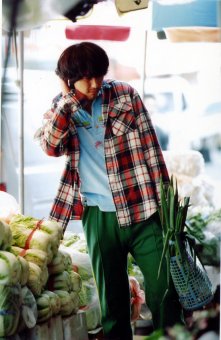 Emphasizing accent and dialect in film is a nuance I greatly appreciate. My paternal family speak with the textures of the Pittsburghese dialect. I remember the day I put to my father the question of why his younger brother's accent is so thick it takes me a few hours to adjust to it, whereas I don't hear the faintest hint of 'yinz' and 'jaggin' in his voice. My father went on to tell me how, once he moved from his hometown of George Blanda to the hometown of me to attend college, he realized how people disparagingly perceived the way he spoke. Because of this, he made the conscious "unconscious" decision to stricken his accent and the vocabulary that came with it from his voice. It's part of my father's migrant story that speaks to a larger immigrant story. (And explains the peculiar allegiance this Cleveland boy has for the Pittsburgh Steelers, the arch rivals of the Cleveland Browns.)
Emphasizing accent and dialect in film is a nuance I greatly appreciate. My paternal family speak with the textures of the Pittsburghese dialect. I remember the day I put to my father the question of why his younger brother's accent is so thick it takes me a few hours to adjust to it, whereas I don't hear the faintest hint of 'yinz' and 'jaggin' in his voice. My father went on to tell me how, once he moved from his hometown of George Blanda to the hometown of me to attend college, he realized how people disparagingly perceived the way he spoke. Because of this, he made the conscious "unconscious" decision to stricken his accent and the vocabulary that came with it from his voice. It's part of my father's migrant story that speaks to a larger immigrant story. (And explains the peculiar allegiance this Cleveland boy has for the Pittsburgh Steelers, the arch rivals of the Cleveland Browns.)
We stereotype in many different ways and dialect is yet another medium for prejudice. I am not clear what the prejudices against or for Daegu dialect are, but the prominence of Daegu dialect in the prostitute character (Hong Ji-yeong) and in "Stray Doggy" (Jung Woo-sung) could present the dialect as demonstrative of illegitimacy and idiocy if Kwak was interested in merely type-casting his characters. Thankfully, he's not. Instead, he wants us to appreciate the struggle developmentally-disabled Stray Doggy has in finding his place in life.
The son of a police chief, Stray Doggy could have it easy. And for the most part he does and this without his father participating in much corruption and pulling of strings. However, Stray Doggy wants more responsibility. He wants a community. He finds it in a gang that really isn't a gang, but when they run up against a real gang taking advantage of them and their families, Stray Doggy strays into greater and greater disreputable activities, leading Stray Doggy to reach a crossroads with his father and the circumstances that brought Stray Doggy into this world.
Unlike Friend (2001), Mutt Boy wasn't successful, and deservedly so. It's not a great movie, lacking the energy and right-film-right-time zeitgeist exploitation of the dialectical Friend. Jung's portrayal of a developmentally-disabled character comes nowhere close to the brilliance of Sol Kyung-gu in Oasis. Something about Jeong's portrayal seems off, but I'd like to read some studies on portrayals of the developmentally-disabled in cinema before I hold strong to that statement. Equally off are scenes that lack a measured rhythm, such as the scene at the police station where Stray Doggy taunts the adult form of a childhood bully. Still, the extended length of the mess of mass nihilism, ala Conduct Zero, in the prison scene is appropriately drawn out to show the boredom of such hypermasculine displays.
It is that scene and one other that saves Mutt Boy from being a complete failure. The other scene involves an exchange between Stray Doggy and the young female, stray delinquent Jeong-ae (Uhm Ji-won) his father brought home to watch over Stray Doggy as a sisterly figure in his life. In this scene she knows he's about to make a choice that will put him in danger of prison if not death, so she taunts him about how he thinks he's so 'great' and 'cool' to fight the big boys, mistakenly hoping this will encourage him to retreat from his advance. In a moment when both of them could reach out in solidarity, empathizing with each others plight, she taunts Stray Doggy where it hurts him most, his pride. And Stray Doggy returns with the only trump card of privilege at his disposal - misogyny. He repeatedly, viciously calls her a "shinyeo" or "bitch." Two characters that have a lot of common ground to work from equally sever any connection they might make with each other. It's an illuminating scene of class and gender; all wrapped up in the telling of such struggles on the ground though the nuances of dialect. It's particular and universal at the same time. (Adam Hartzell)
2142 A.D. The world civilizations have collapsed under the weight of environmental pollution. A group of scientific and industrial elites have founded and ensconced themselves in a city named Ecoban, sustained by the Delos System that converts pollutants into a source of energy. The refugees from outside world scrape by in a shantytown Marr, located at the outskirts of Ecoban. The leaders of Ecoban, concerned that the Delos System is running out of resources, secretly plots to destroy Marr and its inhabitants and add their remains to the fuel for the life support system. The hero of the piece is an Ecoban outcast named Shua who seeks to infiltrate the city and shut down the Delos: pitted against him is Ecoban's security chief, top-knotted Simon (pronounced Shee-mon in a Korean way) and a fiery, red-haired female agent Jay, both of who, as it turns out, harbor personal secrets concerning Shua's expulsion from Ecoban.
 Production cost estimated at 10 million dollars, Wonderful Days is the most expensive animation film ever made in Korea, and has been the focus of intense pre-release media hype as well as debates among animation fans. Director Moon S. Kim (Kim Mun-saeng), a veteran of the CF industry and responsible for more than 200 TV commercials, some of which for Hong Kong-based advertisement agencies (Has any Hong Kong resident of this website seen his commercial for the MTR subway? I am curious), has spent close to seven years in conceiving and producing this futuristic extravaganza.
Production cost estimated at 10 million dollars, Wonderful Days is the most expensive animation film ever made in Korea, and has been the focus of intense pre-release media hype as well as debates among animation fans. Director Moon S. Kim (Kim Mun-saeng), a veteran of the CF industry and responsible for more than 200 TV commercials, some of which for Hong Kong-based advertisement agencies (Has any Hong Kong resident of this website seen his commercial for the MTR subway? I am curious), has spent close to seven years in conceiving and producing this futuristic extravaganza.
Wonderful Days is a mixed bag. On the one hand, the film has the kind of dark, shaded beauty that I feel is truly unique in the history of Korean cinema, animated or otherwise, if its designs are somewhat derivative (They seem to be influenced more by American science fiction, including Star Wars, Tron and Altered States, than by Japanese animation as such). As befitting a dystopian setting, the landscape is constantly drenched in rain, and colors are more often than not different shades of brown and blue-gray, but they are never dull or lifeless: authentic lyricism runs through the whole movie, that unifies its tone into a type of romantic melancholia, mourning the loss of warm, forgiving colors, of white flowers and green grass.
The complicated visual elements, a mixture of 2D cell animation, 3D computer graphics and the old-fashioned "special effects" utilizing complex miniatures, is impressive in its attention to detail and its ability to covey fast action with complete legibility. When a gust of wind begins to turn turbo-electric windmills long fallen to disuse, one not only sees the CGI "ripple" that moves the air forward (familiar from movies like Matrix) but also details of the debris that float into the air, painstakingly drawn. The majestic blue sky and moving clouds, close-ups of raindrops drumming on the windowsill, and other breathtaking shots of "nature" seamlessly flow in and out of CGI animation and "real" cinematography.
Unfortunately, at the core of Wonderful Days is a rather trite love-triangle plot that threatens to reduce main characters into scowling paper cut-outs. Particularly disappointing is the character of (beautifully drawn) Jay, who sets out as the narrator of the film, but ultimately turns into a dewy-eyed pretty girl bouncing off like a pinball between two snarling competitors for her affection. The film's overdone climax, complete with floating bubbles of blood, Jay mouthing "Noooo..." silently in slow motion, and an ear-splitting aria in the soundtrack, almost works because it is so obviously sincere, although some of the audience broke out in laughter during the screening I attended.
Despite these excesses and shallowness of characterization, Wonderful Days is not a soulless, corporate-planned entertainment-machine that most Hollywood summer blockbusters have become (It probably has too much soul for its own good, actually). It remains to be seen whether Wonderful Days will turn out to be a hit: a lot is riding on the shoulders of Director Kim and his team since its quick death in the box office will surely doom any large-scale Korean animation project for the foreseeable future. It most likely will not have a wide crossover appeal that simultaneously reaches out to the seekers of "family entertainment," the diehard animation buffs and the connoisseurs of the strange and unique, the way, for instance, a Miyazaki Hayao film could. Still, taken as a departure point for the Korean animation industry, where God knows so many talented people have struggled, for several decades now, to break through the barriers erected by the superior and better-financed Japanese and American animation, Wonderful Days does present a harbinger for the creatively exciting future. (Kyu Hyun Kim)
(Trailer: 300k)
Wishing Stairs is the third installment of the exceedingly popular "Scary Tales in Girl's High School (Yeogo gwedam)" series that had begun with Whispering Corridors (1997), one of the unexpected sleeper hits of the year, and continued on to Memento Mori (1999), considered by many a top-drawer horror film as well as an artistic triumph. Even though it received a fair amount of critical drubbing, Wishing Stairs proved the staying power of the series at the box office by drawing more than two million viewers during the competitive summer season of 2003.
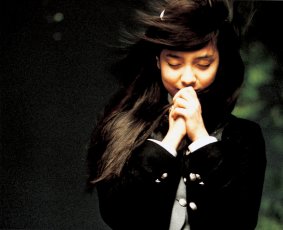 Jin-sung (Song Ji-hyo) and So-hee (Pak Han-byeol) are aspiring ballet dancers in an art academy and best friends. So-hee, a teacher's pet from a privileged background, becomes the object of dark jealousy by Jin-sung, whose dream of winning a scholarship from a Russian ballet academy is about to be upset by her talented and well-connected friend. One day, Jin-sung discovers a sculpture depicting the legendary "fox steps," a class project done by the obese and unhappy Hye-ju (Jo An). The fox spirit is rumored to grant wishes for those who managed to walk on the non-existent twenty-ninth step. Jin-sung and Hye-ju have their wishes granted. Jin-sung wins the scholarship after So-hee falls down the stairs and damages her legs. Hye-ju begins to lose weight. Alas, the poor girls soon learn that the fox plans to extract unspeakable prices for their successes.
Jin-sung (Song Ji-hyo) and So-hee (Pak Han-byeol) are aspiring ballet dancers in an art academy and best friends. So-hee, a teacher's pet from a privileged background, becomes the object of dark jealousy by Jin-sung, whose dream of winning a scholarship from a Russian ballet academy is about to be upset by her talented and well-connected friend. One day, Jin-sung discovers a sculpture depicting the legendary "fox steps," a class project done by the obese and unhappy Hye-ju (Jo An). The fox spirit is rumored to grant wishes for those who managed to walk on the non-existent twenty-ninth step. Jin-sung and Hye-ju have their wishes granted. Jin-sung wins the scholarship after So-hee falls down the stairs and damages her legs. Hye-ju begins to lose weight. Alas, the poor girls soon learn that the fox plans to extract unspeakable prices for their successes.
The rookie director Yun Jae-yeon, recruited to the series on the strength of her award-winning short film Psycho Drama (2000), shows a sure hand over the psychological dynamics of the trio of main characters. The newcomers cast in these difficult roles rise to the challenge with gusto. Jo An, for most of the running time buried under a bodysuit and fat makeup, makes a strong impression, alternately pitiful, humorous and creepy. So does Song Ji-hyo, whose excellent performance as Jin-sung allows her character to be both sympathetic and repugnant, with an added undercurrent of sadness.
Those sections of Wishing Stairs carefully illustrating the cumulative effects of hidden anxieties, petty cruelties and the conflicts between competitiveness and affection in the hearts of young women are very well done. Director Yun emphasizes narrow corridors and darkly lit rooms, with virtuoso manipulation of the reflected imagery, not so much to scare the audience but to cue them toward the subtle psychological turbulence of the characters. Then again, the movie rather awkwardly attempts to boost the scare quotient by slapping together the oft-repeated conventions from (mostly Japanese) horror films. The second half of the screenplay (credited to four writers) feels like a committee product, stitched together from the ideas pitched during chain-smoking bull sessions. In particular, Hye-ju's character (and Jo An's sensitive performance) ends up sacrificed in behalf of that most irritating cliche of all, possession by an evil spirit.
As a horror film, Wishing Stairs is only a middling achievement, although I liked some creative touches that I wish were developed with proper budgets (such as the fox stairs literally coming alive with stone faces and grappling arms). It is far more satisfying as a psychodrama focusing on the complex adolescent feelings of love, jealousy and guilt among the ambitious but talented young women. In that sense, the movie covers the grounds similar to another summer hit of 2003, A Tale of Two Sisters, and even shares the same (pointless) tendency to capitulate to certain horror film cliches (Please, no more young girls with long hair crawling out of narrow openings!). Neither as exquisite as Two Sisters nor as sophisticated as Memento Mori, Wishing Stairs is nonetheless a solid achievement for Director Yun Jae-yeon and its extremely attractive cast, who display a lot of promise. (Kyu Hyun Kim)
(Trailer: 300k)
South Korea has a long tradition of horror films, most of which revolve around ghosts, but in recent years an alternative branch of the genre has started to develop. Movies such as Memento Mori (1999) and Sorum (2001) are really "not-quite-horror" films, in the sense that their primary focus is to explore some cold and unfeeling aspect of modern society. Scaring moviegoers is only a secondary priority, usually done by invoking a creepy atmosphere and soundtrack, rather than chopping up bodies or jumping out from behind doors.
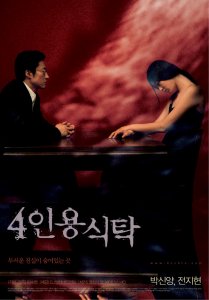 The Uninvited, by debut director Lee Su-yeon (best known previously for her short film The Goggles), falls squarely into this category. Although there are a few jolts in the film, and some children get disposed of in particularly gruesome fashion, much of the work is dominated by a brooding and at times mystic atmosphere. The movie tells the story of Jung-won, a newly-engaged interior decorator who is suffering from feelings of anxiety. After seeing a creepy vision in his kitchen one night, he begins to doubt his own sanity, until he comes across a mysterious woman named Yeon who can see the same things that he can. Drawn to her, he discovers that she can tell him things about the past that he never even dreamed of.
The Uninvited, by debut director Lee Su-yeon (best known previously for her short film The Goggles), falls squarely into this category. Although there are a few jolts in the film, and some children get disposed of in particularly gruesome fashion, much of the work is dominated by a brooding and at times mystic atmosphere. The movie tells the story of Jung-won, a newly-engaged interior decorator who is suffering from feelings of anxiety. After seeing a creepy vision in his kitchen one night, he begins to doubt his own sanity, until he comes across a mysterious woman named Yeon who can see the same things that he can. Drawn to her, he discovers that she can tell him things about the past that he never even dreamed of.
When watching The Uninvited (the original title means "A Table for Four") you get a clear sense of the director's ambition to create a thematically and aesthetically challenging work. This can be seen in some unusual uses of sound and a multi-layered, complex narrative, not to mention an unusually long running time of 126 minutes. In fact, many critics feel that she may have been a little too ambitious -- simplifying and shortening the script a bit would probably have given the film more impact.
Lee does succeed admirably in transforming her two lead actors. Park Shin-yang, known for playing gangsters or romantic leads (sometimes at the same time), is far easier to relate to as the somewhat ordinary Jung-won. I admit that much of Park's acting in the past has turned me off, but his performance here was a pleasant surprise. Meanwhile the hugely popular actress Jeon Ji-hyun, in her first role since the smash hit My Sassy Girl, is almost unrecognizable as the soft-spoken Yeon. She plays the character as being very frightened by the uncontrollable visions she sees, while at the same time being a bit spooky herself.
Like some other Korean films before it, such as Happy End (1999) and Barking Dogs Never Bite (2000), the film gives a striking depiction of a common feature of the Korean landscape: the apartment building. A pervasive symbol of middle-class wealth, the image of countless, identical living spaces also carries with it a sense of claustrophobia, and perhaps a pressure to conform. Placing Yeon, who will never fit into mainstream society because of the visions she sees, into the space of the apartment building makes for a bittersweet juxtaposition.
Released in August, which has become Korea's peak season for horror movies, The Uninvited turned out to be not what most South Korean viewers were in the mood to see. Despite the star power surrounding Jeon Ji-hyun, the film underperformed at the box-office relative to expectations. Critics were kinder, however. Although some focused on the work's weaknesses, others were captivated by the director's strong and distinctive style. Personally, I agree that The Uninvited is a striking film driven by a strong vision, but in places it still feels like a flawed work. I'm looking forward to bigger and better things from this director in the future. (Darcy Paquet)
(Trailer: 300k)
Mirror, mirror, on the wall: which is the scariest horror film of them all? Well, not Into the Mirror. But that turns out not to be a problem, after all.
A mirror is an object that has been a part of human civilizations for many millennia, once reserved only for ceremonial or religious purposes. Today, a mirror is, like a clock or a ball-point pen, so closely integrated into our everyday lives that we are no longer conscious about its presence. At the same time, reflections in the mirror still hold, and always will hold, a certain uneasy fascination for the imaginative, the sensitive and the paranoid among us, as the myth of "Bloody Mary," for instance, attests to. Needless to say, filmmakers have exploited our fear of and attraction to the mirror image throughout the history of cinema, from Jean Cocteau's sublime Beauty and the Beast (1946), to John Carpenter's wacky Prince of Darkness (1987), in which the Devil tries to crawl his way out of the "alternative dimension" via a lady's compact mirror, to Sam Raimi's sublimely wacky Evil Dead (1981), where Bruce Campbell plunges his hand into a mirror, horribly but poetically transformed into a pool of blood.
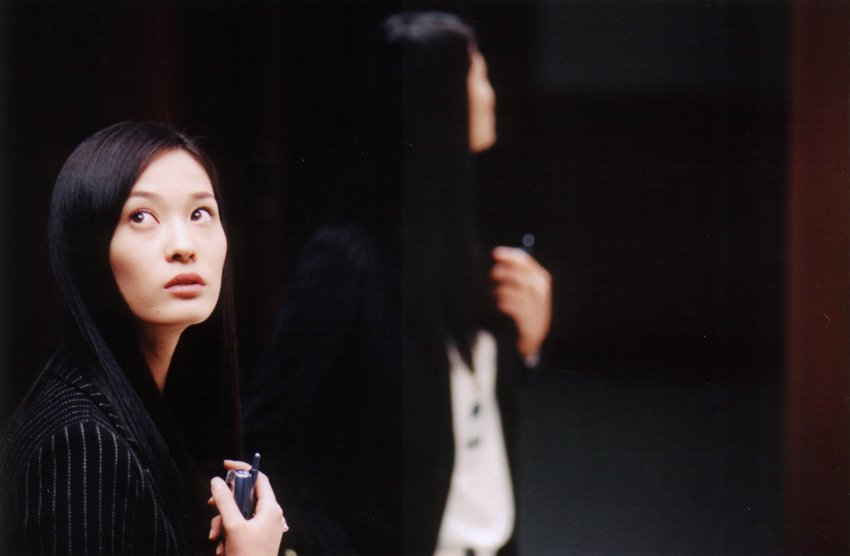 Into the Mirror, supported by the New Directors in Focus program at the Pusan Film Festival in its early development stage, is an intriguing debut film by Kim Sung-ho, a former architect whose deft manipulation of the spatial and optic dimensions of the film results in its unique and memorable look and atmosphere, overlaid with a layer of modernist austerity.
Into the Mirror, supported by the New Directors in Focus program at the Pusan Film Festival in its early development stage, is an intriguing debut film by Kim Sung-ho, a former architect whose deft manipulation of the spatial and optic dimensions of the film results in its unique and memorable look and atmosphere, overlaid with a layer of modernist austerity.
Yu Ji-tae (Oldboy, Attack the Gas Station) plays U Young-min, a cop-turned-security chief at a department store, investigating a series of inexplicable suicides. Young-min, unable to look into a mirror since he had mistakenly caused his partner's death, becomes convinced that the victims were somehow dispatched by a presence inside the mirror. In the course of investigation, he encounters the mentally disturbed Ji-hyeon (Kim Hye-na, Flower Island), who is equally obsessed with the mirror. Meanwhile, Young-min's skeptical former colleague Hyeon-su (Kim Myeong-min from Sorum) begins to regard him as the prime suspect.
Keeping the film's plot almost self-consciously generic, Director Kim, DP Jeong Han-cheol (Yesterday), production designer Lee Hyeong-ju (L'Abri) and the rest of the staff instead focus on extracting suspense, tension and even a sense of magic out of the various scenes involving mirrors as well as the main characters' relationships with their "reflected selves." There are several genuinely impressive set pieces in the film that showcase the filmmakers' ingenuity and skills, such as the "infinitely reproduced reflections" scene depicting Chief Kim's (Jeong Eun-pyo, Break Out, Bet on My Disco) demise.
Smart, complex and a tad chilly, Into the Mirror is one of those rare Korean films that do not feature family dinners, young girls chit-chatting on cell phones, the inebriated men hailing taxicabs or bathroom antics. Its characters firmly remain within the perimeters of genre types (A disgraced cop, a mystery woman who holds the key to the puzzle, a money-grubbing capitalist who ignores the warning from the hero, and so on).
Not that the cast is not terrific. Kim Myeong-min plays a straight cop, but with his peculiar, almost reptilian intensity intact. The if-he-does-not-appear-in-it-it's-not-a-Korean-film super-veteran Ki Joo-bong has one of his most substantial roles in recent years, essaying a petty tycoon, driven and covetous, but not shrewd enough to recognize his true enemies behind their sheep-skin disguise. Kim Myeong-su, the North Korean superior in Joint Security Area, has a grand time portraying another hissable villain, dripping mock sincerity while fixing his predatory gaze on his victims. I was taken aback to learn from the director that the department store guard, who strangely resembles Ki Joo-bong's CEO, is in fact played by his real-life brother Ki Guk-seo. The "subliminal mirror effect" generated by this casting really worked on this reviewer: the result is wonderfully uncanny. On the other hand, Yu Ji-tae is somewhat disappointing, not quite persuasive as a man immobilized by guilt and self-imposed isolation, although he has a nice breakdown scene that seamlessly merges into a moment of effective psychological terror.
I must warn that some viewers may be befuddled or annoyed by the twist and turns of the narrative, as well as by the film's climactic abandonment of its Ring-like horror premise (which was a red herring to begin with) and transmutation into an almost science fictional, metaphysical fantasy. Still, Into the Mirror is a fine example of the intelligent, thought-provoking cinema fantastique, which one relishes, like Orange Blossom Muscat port, not for its fulfilling taste, but for its distinctive flavor. (Kyu Hyun Kim)
(Trailer: 300k)
The original title of A Good Lawyer's Wife refers to a family where everyone leads a rather errant lifestyle. The husband, a lawyer, is having an affair with a younger woman. The wife starts up an affair with the high school boy next door. Even the husband's elderly mother is seeing another man, and having sex for the first time in 15 years. A glance at the film's poster -- a provocative staging of actress Moon So-ri, who looked so utterly different as the female lead in Oasis -- gives you a pretty good idea of how the film was marketed. Lured by a brash, clever trailer and perhaps a whiff of scandal, audiences bought tickets in droves, pushing the film to #1 at the box-office.
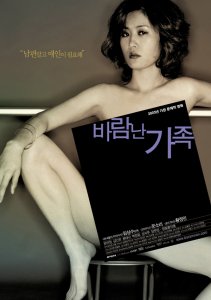 Actually, the scandalous outer layer of A Good Lawyer's Wife can be peeled back to reveal a quite serious and nuanced core. Director Im Sang-soo has already shown a talent for presenting frank sexuality and nonconformist heroes in his two previous films Girls' Night Out (1998) and Tears (2001), but A Good Lawyer's Wife establishes him as a director with formidable skill and potential. Im's reputation abroad was given a boost when the film was invited to the main competition section at the Venice International Film Festival, where it screened to generally favorable reviews. Yet foreign audiences are likely to view this film in a different way from how it is viewed in Korea, where attacks on the institution of family ring with much stronger resonance.
Actually, the scandalous outer layer of A Good Lawyer's Wife can be peeled back to reveal a quite serious and nuanced core. Director Im Sang-soo has already shown a talent for presenting frank sexuality and nonconformist heroes in his two previous films Girls' Night Out (1998) and Tears (2001), but A Good Lawyer's Wife establishes him as a director with formidable skill and potential. Im's reputation abroad was given a boost when the film was invited to the main competition section at the Venice International Film Festival, where it screened to generally favorable reviews. Yet foreign audiences are likely to view this film in a different way from how it is viewed in Korea, where attacks on the institution of family ring with much stronger resonance.
On one level, the family members presented in this film display a refreshing level of honesty and open-mindedness in their speech and actions (particularly the women). It seems at first that the director is advocating more openness and honesty within families, even at the expense of marital fidelity. Yet as the movie progresses, the mood darkens. Many of the male characters struggle with guilt; the husband's father, for example, drinks to wash away the memory of leaving his own family in the North during the Korean War. Sudden outbursts of blood or violence also punctutate the narrative. We usually think of families as something to shield us against violence, yet on closer examination, much of the pain seen in this film originates in some way from inside the family. Unhappy families are a common sight in contemporary Korean cinema, but very few films ultimately deliver such a sober-eyed and aggressive questioning of the idea of family itself.
In late 2002, production company Myung Films originally cast actress Kim Hye-soo (Kick the Moon, YMCA Baseball Team) to play the lead role of the wife. Kim subsequently changed her mind and pulled out days before shooting started, in order to take a role in the TV drama Jang Hee-bin (which was ultimately a major flop). Myung Films was furious and filed a lawsuit against Kim which was later settled, but in retrospect this was the best thing that could have happened to the movie. Replacement actress Moon So-ri, after her award-winning turn in Oasis last year, portrays an unconventional character with skill, wit, and class. It is almost certain that Kim Hye-soo could never have given the role such life and feeling.
The supporting cast is no less impressive, with Hwang Jeong-min (Roadmovie) as the husband, Yoon Yeo-jung (Kim Ki-young's 1971 feature Woman of Fire) as the husband's mother, Kim In-moon (Hi Dharma, Potato) as the husband's father, Bong Tae-gyu (Tears, Conduct Zero) as the wife's teenage lover, Seong Ji-ru (Tears, H) in an important supporting role, Baek Jeong-rim as the husband's outspoken lover, and Jang Jun-young as the couple's adopted son. All are fantastic, with perhaps a special mention given to Bong Tae-gyu's funny and touching role as the teenage lover. Bong is also involved in one of the film's most cutting inside jokes, when he and Moon So-ri go to a deserted theater to see a movie (Im Sang-soo's second feature Tears, which was a box-office bomb), and he laughs out loud at one of the film's most harrowing scenes, when the main character (played by the same actor!) is sprayed in the face with mace.
A Good Lawyer's Wife turns out to be a much different film than its poster or its breezy, rhythmic editing and music would suggest. This is not a movie about the flaunting of social and sexual conventions, however much it may appear to be. Instead, much of the main characters' breaking with convention seems to be more of a survival mechanism. It's in some ways remarkable that such a serious, downbeat film could have reached so many viewers. In the process, Im Sang-soo has proven that he deserves as much attention as other top Korean directors who emerged in the late 1990s. (Darcy Paquet)
(Trailer: 300k)
There's an old adage amongst film reviewers that it's harder to write a review on a film you love than one you hate. The underlying logic being you are more likely to bring a strong critique to a film you hate whereas you might cut a film you love some slack. For me, however, it's exactly the opposite. When writing about a film I strongly dislike, I feel at risk of presenting an arrogant tone, something from which I would rather refrain since arrogance can catch me off guard, putting me at risk of missing more subtle interpretations.
Such is what brought me to struggle with Eo Il-Seon's Plastic Tree. Not having heard much about this film beyond it receiving a Best Film award at Mannheim-Heidelberg, I figured I'd check it out. And after multiple viewings and multiple rewrites of this review, I am comfortable with my strong dislike for the film.
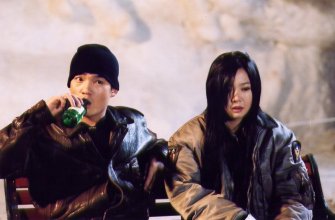 There are two reasons why this film is so troubling, one being the misogyny supported within the text. For those of you who could care less about Feminist critiques, you can skip the last two paragraphs since you won't be hearing me anyway, but I'll begin with the other trouble: The film fails its genre. Plastic Tree revolves around three characters: An effeminate and meek barber named Sue (Kim In-kwon); his girlfriend, Won-young (Cho Eun-sook), who works in a "man's job" delivering packages on her scooter; and an acquaintance from Sue's youth, Byung-ho (Kim Jung-hyun), a hyper-aggressive man prone to verbally mounting Sue to prove his alpha male status. Byong-ho is a "rat in the kitchen", a threat to Sue since he correctly suspects that Byong-ho might steal his girlfriend. Over halfway through we discover the film is supposed to be a psychological thriller. Such is announced by an aural cliche of dissonant, orchestral strings. Major plotlines from which the suspense is to be drawn are then presented through flashbacks, which are more funny than scary. What Eo intends to shock, actually mocks, ending up accidentally parodying himself. If a real effort had been made to deconstruct genre conventions, then we could allow these decisions on Eo's part. But the film purports to be a serious thriller and it fails to maintain suspense when he most wants to manipulate us. And what's most disappointing about Eo's poor use of non-diegetic sound and flashbacks is that his few successful scenes show us he doesn't even need them. The snip-snip-snipping of out-of-frame barber's shears is haunting enough without any symphonic assistance. And the most chilling scene is flashbackless, simply showing Sue squashing a bug while the radio DJ narration in the background illuminates what Sue is really squashing.
There are two reasons why this film is so troubling, one being the misogyny supported within the text. For those of you who could care less about Feminist critiques, you can skip the last two paragraphs since you won't be hearing me anyway, but I'll begin with the other trouble: The film fails its genre. Plastic Tree revolves around three characters: An effeminate and meek barber named Sue (Kim In-kwon); his girlfriend, Won-young (Cho Eun-sook), who works in a "man's job" delivering packages on her scooter; and an acquaintance from Sue's youth, Byung-ho (Kim Jung-hyun), a hyper-aggressive man prone to verbally mounting Sue to prove his alpha male status. Byong-ho is a "rat in the kitchen", a threat to Sue since he correctly suspects that Byong-ho might steal his girlfriend. Over halfway through we discover the film is supposed to be a psychological thriller. Such is announced by an aural cliche of dissonant, orchestral strings. Major plotlines from which the suspense is to be drawn are then presented through flashbacks, which are more funny than scary. What Eo intends to shock, actually mocks, ending up accidentally parodying himself. If a real effort had been made to deconstruct genre conventions, then we could allow these decisions on Eo's part. But the film purports to be a serious thriller and it fails to maintain suspense when he most wants to manipulate us. And what's most disappointing about Eo's poor use of non-diegetic sound and flashbacks is that his few successful scenes show us he doesn't even need them. The snip-snip-snipping of out-of-frame barber's shears is haunting enough without any symphonic assistance. And the most chilling scene is flashbackless, simply showing Sue squashing a bug while the radio DJ narration in the background illuminates what Sue is really squashing.
And it is this scene which codas and alludes to violence throughout the film that is a regressive reaction to shifts in gender dynamics in modern day South Korea. It is here where misogyny finds support, however unintentional. What else can we think when a rape is presented as just what the woman needed all within a filmic text that refuses solidarity across genders, demanding that rigid gender roles be adhered to or else risk psychological damage? Eo even adds to this phallic mis-love story by metaphoring cunnilingus as a symbol of masculine lack rather than one of the varied ways we have to pleasure each other. (It is interesting how the first scene of consensual cunnilingus is portrayed unconvincingly, similar to the fellatio scene in Yu Ha's Marriage is a Crazy Thing, whereas the second cunnilingus scene, arguably another rape scene, is portrayed with striking realism, even showing us some of that, *gasp*, "obscene" pubic hair.)
Yet, I am tempted to temper my vehement opposition because unlike Jung Ji-woo's Happy End, there are fissures within this text. Most striking is a scene where Won-young is ignored when delivering flowers at an office. Looking around that office from Won-young's POV, we see the posters of films such as Chingu and The Uprising that signify we are in a film office. It's as if Eo is indicting the Korean film industry for keeping the plight of South Korean women outside their frames. And later, what is Won-young rebelling against but Sue's idolization of The Mother, an idolatry that is presented as psychotic. Yet all these glimmers of a more liberating text are snuffed out by the fact that Won-young is depicted as stupid, so all her challenges to the social order are not via agency, but via her ignorance of gender protocols the film appears to uphold. Any critique of violence against women is eventually erased. What we are left with is a fine, snowy day that extends the disturbing "remasculinization" trend within Korean cinema for the past two decades noted by scholar Kyung Hyun Kim. (Except, at least in this case, we can take some solace in the fact that, being this was a French co-production, Korean cinema is not solely at fault here.) Considering the title of this film, I was curious if I'd find some Baudrillard-y treatise on the real in the fake, ala Radiohead's "Fake, Plastic Trees". Instead, what I got, intended or unintended, was closer to a misogynistic manifesto. (Adam Hartzell)
Take one part Rain Man, one part Big, one part Jack, and throw in a titular reference to O Brother, Where Art Thou? and you've got a good idea of where Oh! Brothers will take you. Lee Jung-jae (Interview, Asako In Ruby Shoes) plays the Cruise-ish, selfish Sang-woo who discovers he has a 12-year-old half-brother when meeting up with the attorneys overseeing the debt passed onto him following the death of his estranged father. Sang-woo can relinquish this debt inheritance, one that adds to the already insurmountable debt Sang-woo has acquired through the illegal assistance he's received from a crooked cop in blackmailing rich people for his crooked job, if he can locate his father's second wife. This provides for Sang-woo's initial faux-ed interest in chaperoning around the Hoffman/Hanks/Williams composite of a little brother, Bong-ku, played by Lee Beom-soo (Wet Dreams, Singles). Bong-ku, however, resembles anything but Sang-woo's "little" brother. Born with Progeria, a condition that causes hyper-growth, this 12-year-old boy looks as if Sang-woo should be calling him hyung (older brother) rather than the other way around. In fact, Sang-woo initially doesn't want Bong-ku calling him hyung, and not because of the visual dissonance this causes, but because Sang-woo fully intends to use Bong-ku rather than establish anything close to an intimate bond. However, forced into day to day contact with Bong-ku, Sang-woo gradually faces up to the un-severable ties of family and the compassion we hold for all our "brothers."
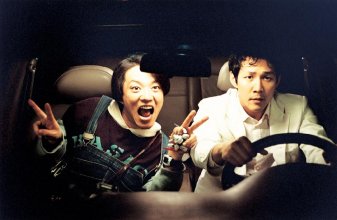 Rather than fall into the easy copycat calls concerning a film that has obvious reference points in previously successful American fare, there is enough Korean specificity within this film to challenge any complete rip-off riffs. The college-age Koreans with whom I shared the theater filled the air with successive, uproarious guffaws when watching Oh! Brothers. I must admit that I missed the humor in some scenes initially, such as the scene where the crooked cop weeps about the harsh treatment older brothers wield upon their younger brothers in Korean society. But watching the film a second time, I found many scenes hilarious. Lee Beom-soo's little-boy-within-the-body-of-a-big-boy antics are at least grin-inducing whenever not fire-in-the-belly funny, particularly in the first scene where Sang-woo uses Bong-ku as a thuggish heavy to extort money from various nefarious "business" associates. I was happy to see Lee Jung-jae stretch out of just a pretty face role here, using his face and the rest of his physicality to exhibit the desired response from the audience, particularly in my favorite scene where he asks a client to translate Bong-ku's swearing sign language to him.
Rather than fall into the easy copycat calls concerning a film that has obvious reference points in previously successful American fare, there is enough Korean specificity within this film to challenge any complete rip-off riffs. The college-age Koreans with whom I shared the theater filled the air with successive, uproarious guffaws when watching Oh! Brothers. I must admit that I missed the humor in some scenes initially, such as the scene where the crooked cop weeps about the harsh treatment older brothers wield upon their younger brothers in Korean society. But watching the film a second time, I found many scenes hilarious. Lee Beom-soo's little-boy-within-the-body-of-a-big-boy antics are at least grin-inducing whenever not fire-in-the-belly funny, particularly in the first scene where Sang-woo uses Bong-ku as a thuggish heavy to extort money from various nefarious "business" associates. I was happy to see Lee Jung-jae stretch out of just a pretty face role here, using his face and the rest of his physicality to exhibit the desired response from the audience, particularly in my favorite scene where he asks a client to translate Bong-ku's swearing sign language to him.
And the presence of multiple characters fluent in Korean Sign Language is an interesting choice on the part of director and screenwriter Kim Yong-hwa. Comedy often requires pushing boundaries of what's acceptable and unacceptable, and such efforts often lead comedians to poke fun at differences that are not of the personality quirk variety, but of physical differences that objects of said humor can't change. As if concerned with charges of disrespect towards the disabled, Kim brought in a subplot of multiple deaf and mute characters whose linguistic difference is respected, and whom the film does not exploit for humorous effect. In fact, Hyun-jin, a mute character who signs to communicate, is presented as confidently defiant in her challenge to her father's commands to not marry her paraplegic boyfriend.
Kim has provided a very tight script that works off the humor that naturally arises when different worlds collide while also providing just enough back story to allow subplots to flow nicely into each other. Almost everything has a purpose here, such as why Sang-woo takes photographs of adulterers, and every little quirk of the characters is utilized for greater effect later on, such as Bong-ku's tactics of extortion through squatting. Compared to the other Korean comedies from 2003 that I've seen so far, Oh! Brothers! was definitely the best, and it appears Korean audiences agreed, since it was the most commercially successful of all the comedies released that year. In the end, as much as this film may have Jack-ed Big Rain Man antecedents, it's still very much its own Korean film. (Adam Hartzell)
![]() Spring, Summer, Fall, Winter... and Spring
Spring, Summer, Fall, Winter... and Spring
When asking my opinion about Kill Bill 2, a good friend of mine was shocked to hear I hadn't seen either yet (and still haven't). "That surprises me since you're so into Asian film," was his response to this news. I jammed my friend's 'logic' by clarifying that the Asian film references that fill Kill Bill are not the Asian films I seek out. This is not a slam on Tarantino, he's a wonderful collage artist. Nor is this a slam on those types of films, those films emphasize what many find pleasurable about cinema - spectacle. But Tarantino isn't referencing Tsai, Hong, Hui, or Oshima, in his Kill Bills so it wouldn't be up high on my NetFlix list if I were to have one.
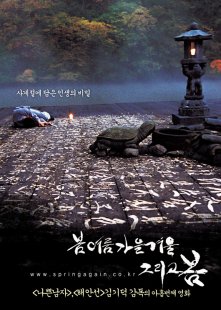 But many Westerners share my friend's template of what constitutes an "Asian Film", that is, some combination of martial arts, samurai, wire-fu, gangsters, violence, and soft porn. And knowing this, it is no surprise that Kim Ki-duk's films have been embraced by Western critics. Kim's The Isle has solidified his place in the Westernized canon of Asian films due to an incident at New York's Asian Film Festival where an audience member left a screening gagging like the main character in the film and falling to the lobby floor. Known for his creative maiming and killing off of his characters, Kim has been embraced by the same cult aficionados who anxiously await the next Miike Takashi flick.
But many Westerners share my friend's template of what constitutes an "Asian Film", that is, some combination of martial arts, samurai, wire-fu, gangsters, violence, and soft porn. And knowing this, it is no surprise that Kim Ki-duk's films have been embraced by Western critics. Kim's The Isle has solidified his place in the Westernized canon of Asian films due to an incident at New York's Asian Film Festival where an audience member left a screening gagging like the main character in the film and falling to the lobby floor. Known for his creative maiming and killing off of his characters, Kim has been embraced by the same cult aficionados who anxiously await the next Miike Takashi flick.
Thus, Kim's homage to the seasons, Spring, Summer, Fall, Winter, . . . and Spring was readied for immediate acceptance by Western critics. Yet, these same critics were surprised by what they saw, saying that Spring . . . was much tamer than Kim's previous fare. But it appears the Buddhist parables -- some true to scriptures and others entirely made up -- that Kim, himself a Christian, presented in Spring... met other requirements of Western templates of Asian films, providing the necessary exoticism.
Taking place within a small lake with a Buddhist temple floating in the middle, we follow the seasons of an abandoned child under the initial tutelage of an elder monk as the child grows up into an adolescent, to adulthood, then finally to old age himself. Each stage and season presents particular trials for the main character. The first trial is reminiscent of another Buddhist film, Why Has Bodhi-Dharma Left for the East?, where the young child learns about death through his participation in the result. But Kim adds his own images to the Buddhist film genre with a nice scene of painstakingly carving a long sutra into the porch of the floating temple that is later painted with a cat's tender tail. Kim himself appears in the film as the enlightened monk, all bare-chested, thrusting his limbs in flashshots of his martial arts skills, leading some viewers to interpret this as exemplifying Kim's very un-Buddhist Big Ego. However, as has been noted in the Discussion Board, Kim's presence is a result of his challenging schedule and production methods. The actor that was to play the role could not, so Kim stepped in at the last minute. No ego; just practicality. (OK, maybe a little ego.)
If I were to compare Spring. . . to Korean Buddhist films that came before it, I would say I didn't enjoy it as much as Why Has . . . but much more than A Little Monk. And if I were to place this within the limited number of Kim's films I've seen, I still find The Isle to be his masterpiece due to its disturbing take on beauty. Interestingly, although many critics have commented on this film being less violent, the torture and killings are all still there, just more subtle. And with the exception of a creative instance of self-annihilation, the killings are all forced upon animals and women. One woman in particular has her death set up as if to convey punishment for her preceding action. Although Korean film scholar Kyung Hyun Kim, commenting before this film was completed, argues that Kim Ki-duk's misogyny is the result of the absence of female agency rather than an active misogyny, this particular female death juxtaposed against a male's contemplative -- dare I say "beautiful"? -- suicide suggests there might be more to claims of Kim's misogyny than mere absence of female autonomy. (Like, why doesn't Mom get to carve through her so-called "sin"?)
Still, there are wonderful moments in this film, such as the simple pleasure of the meditative environment Kim places us within, the floating temple, the parable-carving. Kim even includes a sexy scene of the two lovers sneaking into one another's embrace behind the sleeping eyes of the elder monk. Having wall-less rooms inside the temple where one is still required to walk in and out of a door is a wonderful touch on Kim's part, reminiscent of a stage play. Kim can be a skilled director, having shown us fascinating floating worlds in Spring. . . and The Isle with enough nuances in each to not be accused of repeating himself.
Still, I do hope Kim will not become the sole director associated with Korean cinema in the West. There is so much cinematic seasoning available for our visual palettes that it would be disheartening to have Kim's creative exploits into suffering and killing dominate the Western discourse of Korea's place within the constraints of the "Asian Film" category. But the strength of Kim's vision and the stubbornness of my country's mainstream media's need to lazily categorize films of the Other may leave my hopes waning. (Adam Hartzell)
There is a memorable passage in one of William Gibson's lesser-known stories, "The Gernsback Continuum," (1981) in which the protagonist observes a couple from the future as imagined by Hugo Gernsback writing in the 1930s, white, blonde, with flawlessly sculptured features, dressed in silver jumpsuits, taking nourishment from aspirin-sized pellets containing all the necessary proteins, carbohydrates and vitamins, and gazing with approbation at the immaculate, Art Deco skyscrapers, jutting into the heavens in a world apparently free from the scourges of totalitarianism, religious fanaticism, environmental destruction and other ills that plague our own "present," once the "future" for Gernsback. The protagonist's ultimate reaction to this "perfect" future, however, is one of horror. For him, the technologically perfect future without the historical and cultural content is the equivalent of a beautiful human being without conscience... or soul.
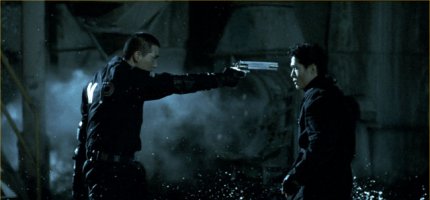 One of the most frustrating aspects of contemporary Korean cinema has been its inability to present us with a persuasive and meaningful vision of the future. Korean filmmakers appear singularly incapable of understanding the science fiction as a cinematic genre. When they try their hands at SF, they tend to approach the genre from its surface (Let us for now set aside the extraordinary Save the Green Planet, a movie all but defined by its refusal to be bound into any specific genre): by copying the colors and forms of the acknowledged classics of SF cinema, (all post-Star Wars, or post-Blade Runner, naturally) and by trying to present the images of 500-story skyscrapers and Brobdingnagian dirigibles, and of hot young actors and actresses (or hot young animated characters) in tight-fitting, curvy uniforms. Make no mistake, Korean SF films are getting prettier, snazzier, glossier: the awkward gap between the filmmaker's imagination and the technological know-how needed to translate it into cool visuals is closing fast, as evidenced by the latest exhibit, Natural City. And yet, Natural City is in the end hollow and contentless, just as the future world imagined by Gernsback.
One of the most frustrating aspects of contemporary Korean cinema has been its inability to present us with a persuasive and meaningful vision of the future. Korean filmmakers appear singularly incapable of understanding the science fiction as a cinematic genre. When they try their hands at SF, they tend to approach the genre from its surface (Let us for now set aside the extraordinary Save the Green Planet, a movie all but defined by its refusal to be bound into any specific genre): by copying the colors and forms of the acknowledged classics of SF cinema, (all post-Star Wars, or post-Blade Runner, naturally) and by trying to present the images of 500-story skyscrapers and Brobdingnagian dirigibles, and of hot young actors and actresses (or hot young animated characters) in tight-fitting, curvy uniforms. Make no mistake, Korean SF films are getting prettier, snazzier, glossier: the awkward gap between the filmmaker's imagination and the technological know-how needed to translate it into cool visuals is closing fast, as evidenced by the latest exhibit, Natural City. And yet, Natural City is in the end hollow and contentless, just as the future world imagined by Gernsback.
I do not feel any great compulsion to delineate Natural City's plot, dull and timid as it is. Suffice to state that the tragic romance between R (Yu Ji-tae), a member of the elite police force in a future Korea, and Ria (Seo Rin), a female cyborg whose lifespan is coming to an end, is its core narrative, into which a whole lot of characters, such as the evil Dr. Jiro (Jeong Eun-pyo) and R's buddy Noma (Yun Chan), and subplots are thrown in to make it more convoluted than it ever needs to be. The film lifts setups, ideas and even visual designs from Blade Runner (1982) and Ghost in the Shell (1995). These instances of "homage" are so mind-numbingly familiar that they cannot even provide the vapid pleasure of the "find-the-reference-to-another-(better)movie" game: the only "creative" modification of the borrowed elements I found was the graphic dismantling of the used-up female cyborgs at the beginning of the film, as opposed to the birth of one in Ghost.
True, Natural City does improve upon its SF predecessors such as Wonderful Days and Yesterday in terms of technical achievements and arresting visuals. The CGI effects and physically built sets are well integrated for the most part. Sound designs are superb in some scenes. I also liked the action scenes, choreographed and featuring Jeong Doo-hong (who really should be given a project of his own to star and direct) as the supreme warrior cyborg, even their weird and jarring use of time-lapse cinematography, at least until the climax when it all deteriorates into Revenge of the Slow-Mo Ninja.
The biggest weakness of Natural City is that the central conceit of the film, the romance between a human being and an artificial person, instantly fizzles out. R is an extremely irritating non-personality: a sorehead who's got no ability to communicate his feelings. Ria, as a perfect counterpart, is a vacant porcelain doll, totally self-contained in her misery, not even petulant or resentful. We are not given any clues as to just what R saw in Ria that made her so attractive in the first place. By the two-thirds point of the film, I was desperately hoping that Ria should go completely berserk and rip R's arm out of its socket.
Director Min Byeong-cheon (Phantom the Submarine) and the crew put a lot of time and effort into the film, and it shows. The problem is that, to paraphrase Stephen King's disgruntled response to Stanley Kubrick's adaptation of The Shining, Natural City is like a beautiful, scarlet-red Ferrari, hand-made right down to the bolts in the wheels... that has no engine. It is gorgeous to look at, but it does not move us, utterly incapable of transporting us to a new place, where we have not been before but have yearned to visit in our dreams. What is the point of a science fiction if it cannot stimulate our minds as much as our eyes and ears?
Perhaps it is time for South Korean filmmakers who love science fiction (I know you are out there! Maestro Pak, are you listening?) to remind themselves of the truism that spiffy special effects and hot actors and actresses in shiny jumpsuits are not what makes great science fiction... that in Jean-Luc Godard's Alphaville (1965) the gumshoe Eddie Constantine travels to the other side of the galaxy by riding an ordinary taxicab. (Kyu Hyun Kim)
Eighteenth-century epistolary novels don't generally form the basis for record-breaking opening weekends at the box-office. This rule is no less true in Korea than in other countries, but 2003 has been a year of surprises. After a resounding flop with his second film Asako in Ruby Shoes in 2001, director E J-yong has taken French novelist Choderlos de Laclos' Les Liaisons Dangereuses and moved it not forward in time -- as with the 1999 Hollywood film Cruel Intentions -- but laterally to the other side of the planet to Korea's Chosun Dynasty. This weird fusion of 18th century French and Korean cultures has resulted in a stimulating and convincing adaptation. It's not hard to imagine a hypocritical and double-faced Chosun society that could rival the characters in Laclos' book.
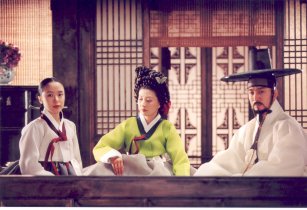 First: if you've seen Stephen Frears' Dangerous Liaisons or read the original novel, then don't go into Untold Scandal expecting major departures in the plot. The basic narrative and characterization are more or less the same, with only small adjustments made to broker a neat fit with 18th-century Korean society. Instead, approach the film as you would a new, contemporary staging of your favorite classic play. You've already memorized your favorite lines, but you'd like to experience it again and see what the new setting will do for the overall effect.
First: if you've seen Stephen Frears' Dangerous Liaisons or read the original novel, then don't go into Untold Scandal expecting major departures in the plot. The basic narrative and characterization are more or less the same, with only small adjustments made to broker a neat fit with 18th-century Korean society. Instead, approach the film as you would a new, contemporary staging of your favorite classic play. You've already memorized your favorite lines, but you'd like to experience it again and see what the new setting will do for the overall effect.
The new setting in Untold Scandal is striking. The vibrant, gently clashing colors of the costumes and sets give a visual counterpoint to the sensuality of the story. Sex scenes -- far more explicit than in previous film adaptations -- collide with our preconceived images of old Korea. In contrast, the movements of the characters in day to day life are elegant in their restraint, echoing the strict moral code of Chosun society around which our characters must negotiate. The dialogue is also elegant and rich in color, an extra bonus for native speakers of Korean.
A recent internet poll posed the question of why the film was so commercially successful (over 3 million admissions nationwide), and respondents gave primary credit to the cast. The movie's women are proven acting talents: Lee Mi-sook, a star of the 1980s (in such films as Bae Chang-ho's Whale Hunting) who resurrected her career with director E's first film An Affair (1998), has already earned a Best Actress citation from the Korean Critics Awards for her portrayal of Lady Cho (the "Glenn Close character"). She has more than enough poise, presence and sensuality to excel in the role. Chameleon Jeon Do-yeon, reknowned for choosing widely diverse roles and playing them all equally well, takes the film's most serious part, and gives it great depth. Most attention was focused on male lead Bae Yong-joon, however. Having reached the pinnacle of fame in the TV drama sector with his clean-cut, nice boy image, he surprised many people by landing such a risque part for his cinematic debut. Some predicted disaster; he actually pulled off the part better than expected, though in many ways he is overshadowed by the women in the film. Memories of John Malkovich also set a high standard to live up to.
If Scandal is primarily about execution, however, then director E J-yong must be given the most credit (an interview with the director is also available on this site). He keeps a familiar story interesting by virtue of unexpected juxtapositions (for example in the soundtrack, a mix of classical European and Korean music), visual elegence, and efficient storytelling. He stays true to the spirit of the original novel while giving it an entirely new aesthetic. More than anything else, it is entertaining. Not intended as an art film, Scandal is a notable example of fashioning a modern-day blockbuster from a completely unexpected set of ingredients. (Darcy Paquet)
(Trailer: 300k)
Acacia, the third motion picture directed by Pak Ki-hyung (Whispering Corridors, Secret Tears) and starring Sim Hye-jin, the big star of the early 90s, was the closing film for the 2003 Pusan Film Festival.
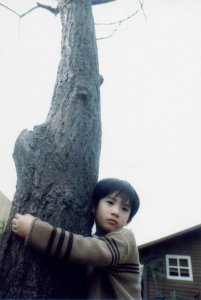 A childless couple Mi-suk, a textile artist (Shim Hye-jin), and Do-il, a successful obstetrician, adopt an orphan, Jin-seong. Unfortunately, he turns out to be a creep (Of course. This is a horror film, right?), obsessed with an idea that his birth mother was reincarnated into a tree. He quickly grows attached to the dying acacia tree in his new house. When the boy goes missing after a particularly stressful night, the couple's married life begins to unravel.
A childless couple Mi-suk, a textile artist (Shim Hye-jin), and Do-il, a successful obstetrician, adopt an orphan, Jin-seong. Unfortunately, he turns out to be a creep (Of course. This is a horror film, right?), obsessed with an idea that his birth mother was reincarnated into a tree. He quickly grows attached to the dying acacia tree in his new house. When the boy goes missing after a particularly stressful night, the couple's married life begins to unravel.
Acacia is a perfect horror film for those who dislike the horror genre, bemoan the sensationalism of garden-variety horror films and are on the lookout for a "meaningful" example that "transcends the limitations" of the genre. For fans of the genre, conversely, it is a major disappointment, a clunky, lugubrious effort that telegraphs its "shocking" contents in big, block letters.
The central conceit of the "tree ghost" could have made for an interesting monster (not a very original idea, but how many original monsters can there be anyway?), but the way director Pak approaches it is rather unimaginative. Every single thing the "tree ghost" does in this film is completely predictable. The ambulatory tree that appears for all of five minutes or so in Poltergeist is much scarier than this film's acacia. And then there are embarrassing or confounding moments, such as the "death by ant attack" sequence featuring what appear to be one dozen ants (Was the old man suffering from a severe case of myrmecophobia?), weird arrangements of classical chestnuts for the background music (Wasn't that Rachmaninoff's Vocalise sung by a boy used in the climactic scene?) and spreading the key murder scenes over the end credits (To prevent the viewers from leaving the theater in a huff?). As for the "plot twists" in the climax, the tone is too dark, the household too antiseptic, the husband and wife too twitchy in the early part of the movie for the viewers to be surprised by them.
While not a total loss, (there are sporadic sequences that are effective, such as Do-il's nightmares about delivery of his child, or Jin-seong's friendship with a vaguely ESP-gifted girl next door) Acacia is uncomfortably caught between generic expectations and the director's ambition to inject (moralistic) commentaries about the state of (bourgeois) family life in contemporary Korea, chasing after two rabbits and losing both. (Kyu Hyun Kim)
For much of the 20th century, a rabid anti-communism formed the South Korean government's most important ideological pillar. Bolstered by U.S. policy and by the military threat posed by its neighbor to the north, this anti-communism spread to affect all layers of Korea's politics and culture. For filmmakers, this resulted in severe pressure to depict North Koreans and communist sympathizers as purely evil, black against white. For those South Korean citizens who openly promoted the communist cause, this resulted in long sentences in jail under the nation's oppressive National Security Law.
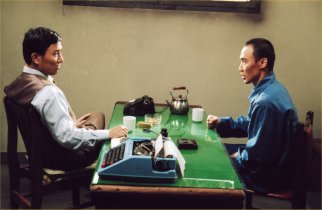 The Road Taken depicts the true story of Kim Sun-myung, a man who was arrested in 1951 for siding with the North during the Korean War. Sentenced to life imprisonment, he spent the coming decades being transferred from one prison to the next, together with other communist sympathizers. The film follows Kim's life from the 1970s, when an unexpected thaw in relations between North and South led to hopes of reunification, up until the 1990s when Kim was recognized by Amnesty International as the longest-serving political prisoner on earth.
The Road Taken depicts the true story of Kim Sun-myung, a man who was arrested in 1951 for siding with the North during the Korean War. Sentenced to life imprisonment, he spent the coming decades being transferred from one prison to the next, together with other communist sympathizers. The film follows Kim's life from the 1970s, when an unexpected thaw in relations between North and South led to hopes of reunification, up until the 1990s when Kim was recognized by Amnesty International as the longest-serving political prisoner on earth.
For much of his time in jail, Kim faced a choice. (The film's original Korean title translates as "The Choice.") Prisoners who agreed to sign a disavowal of their communist beliefs would be set free immediately. Those who refused would be beaten or locked in isolation, forced to continue serving their sentences. Apart from depicting the moving story of a man who suffered for his beliefs, The Road Taken considers the meaning of this choice, and the process by which our convictions come to shape who we are.
Director Hong Ki-seon's film is presented in a remarkably straightforward style; some might call it old-fashioned. Like many prison-set movies, the presentation of the drama inside such a confined space leads to the sense that you are watching a play. Certainly this story could work just as well as a stage production. My initial reaction when watching the film was disappointment that the director did not make more effort to develop it from an aesthetic standpoint. On the other hand, repeated viewings have persuaded me that the film works as it is, without stylistic flourishes.
Certainly under Korea's past governments, this film could never had been made. The fact that we are watching works like this and Kim Dong-won's similarly-themed documentary Repatriation (which makes an excellent companion piece to this film, and indeed which far surpasses it) is a victory in itself. The passion of director Hong and lead actor Kim Joong-ki come across clearly to the viewer. It is also nice that the film makes an effort to understand its chief "villain," a correction officer played by An Seok-hwan. The candid relations between him and our lead is one of the film's pleasant surprises.
Probably the most moving and effective scene in The Road Taken is a piece of real footage inserted at the end, of Kim Sun-myung in the 1990s. The actors need not feel ashamed at being upstaged at the film's conclusion by a television clip. Everyone involved with the production would surely agree that moreso than the film itself, the real story behind the screenplay is one of modern Korean history's most tragic and urgent narratives. (Darcy Paquet)
Writer/director Yong Yi's experience directing numerous TV commercials sure came in handy with his debut feature film since it contains a preponderance of product placements. Although some of these product placements are disturbingly blatant (and I won't assist in this branding by naming the companies), upon later viewings, I noticed that each one was subverted in some way. The burger joint plugged is incorporated into the story as a site of disgust or loneliness. The ice cream parlor plugged has Hyun-chae (Bae Doo-na) and Ma-rin (Yoon Ji-hye) ridiculously glutton on an entire friggin' ice cream cake. And considering that the ending -- (Don't worry, I'm vague enough as to not spoil anything here, but some of you may still want to skip the rest of this sentence) -- consists of Hyun-chae running away from a rented space of consumer goods towards a communal space of the public good, it's as if Yong is not only biting the hand that presently feeds him, but the hand that's been feeding him for quite some time.
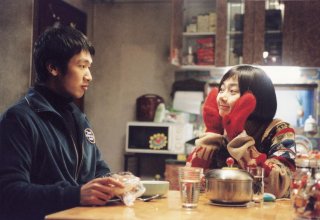 This being a romantic comedy, we expect to be fed laughs along with the romance. For the most part, for me at least, both requirements are satisfied. Spring Bears Love follows the not always so lovely Hyun-chae as she stumbles upon notes scribbled into a series of art books from the public library which she quickly assumes are written specifically for her. Weaved into this plot is the not always so handsome Dong-ha (Kim Nam-jin) who has had a crush on Hyun-chae since high school and hopes to rekindle what was never there to begin with. The art books provide stepping stones into interesting fantasy sequences where Hyun-chae becomes immersed in the artists' images while guessing who her presumed suitor is, with the alleged suitors providing the narration of the notes vandalized within the library art books. The film plays around with ugly-duckling/cinderella-esque tropes that contaminate many melodramas and we watch as Hyun-chae refuses what's right in front of her while pursuing her flights of fancy. Nicely accompanying the scenes is a jazz-pop soundtrack scored by Yoon Jong-shin, (who also plays Hyun-chae's single father), including a perfect Greek Chorus in a style reminiscent of Manhattan Transfer that repeatedly begs, "Don't Make a Sad Moooovieeeee!" Variations on this melody are placed as codas during sad moments as anchors stating, 'Don't worry, it'll all be alright in the end.'
This being a romantic comedy, we expect to be fed laughs along with the romance. For the most part, for me at least, both requirements are satisfied. Spring Bears Love follows the not always so lovely Hyun-chae as she stumbles upon notes scribbled into a series of art books from the public library which she quickly assumes are written specifically for her. Weaved into this plot is the not always so handsome Dong-ha (Kim Nam-jin) who has had a crush on Hyun-chae since high school and hopes to rekindle what was never there to begin with. The art books provide stepping stones into interesting fantasy sequences where Hyun-chae becomes immersed in the artists' images while guessing who her presumed suitor is, with the alleged suitors providing the narration of the notes vandalized within the library art books. The film plays around with ugly-duckling/cinderella-esque tropes that contaminate many melodramas and we watch as Hyun-chae refuses what's right in front of her while pursuing her flights of fancy. Nicely accompanying the scenes is a jazz-pop soundtrack scored by Yoon Jong-shin, (who also plays Hyun-chae's single father), including a perfect Greek Chorus in a style reminiscent of Manhattan Transfer that repeatedly begs, "Don't Make a Sad Moooovieeeee!" Variations on this melody are placed as codas during sad moments as anchors stating, 'Don't worry, it'll all be alright in the end.'
The film is anything but close to perfect, most strikingly due to the chasm-sized plot holes that emerge when the secrets are revealed at the end. However, there are some pleasantly funny moments throughout, such as when Hyun-chae is caught gazing at one of her alleged suitors and she covers for her gaze with an impromptu sales pitch to an older woman near the product she just happens to be standing by, adult diapers. How Hyun-chae closes that sales pitch with an anti-sales pitch is classic comedy. Being the lead, requirements are that Bae carry this film, but she does receive significant help from Kim, who plays Dong-ha in such a way that we can understand why Hyun-chae would be ambivalent about starting a relationship with him. And Yoon's Ma-rin could have easily fallen into the latter end of the Madonna/Whore dichotomy, but instead she plays her character with enough depth that we can understand why Hyun-chae would befriend her. It is the former end of the dichotomy, the character of So-hee (Im Hyun-kyung), who lacks any sense of development, (no fault to Im because she wasn't given anything to work with), and the Deaf character is portrayed with an innocent veneer that is similarly too simple.
But it is Bae who goes to town here. Unlike Saving My Hubby, the comical histrionics are dampened whenever they are about to get out of hand. Thus, the childish immaturity of Hyun-chae appears to represent merely growth issues for the character rather than serious pathology such as demonstrated by the character of Eun-hui in Bizarre Love Triangle. And when Hyun-chae does the Cabbage Patch all dressed up in a bear costume in the first fantasy sequence, I mean, I can't help but giggle appreciatively at the simple absurdity of it all, which is exactly the point of such a scene.
So, do I like Spring Bear? 'Eh, it's ok.' And, just like ramen, sometimes that's enough for me. (Adam Hartzell)
(Trailer: 300k)
Goofy is about the only way to describe this movie. It's even goofier than the Hong Kong hit The Twins Effect, which I watched on DVD the day before. I'm not necessarily being critical when I say this, but no other Korean film fits the description so well.
 It focuses on an issue that occupies a prime place in the minds of many young Koreans: learning English. Our hero, a public servant, is pushed to take English classes when she is unable to help a foreigner who comes into her office looking for assistance. Signing up at a language institute (and placing into the lowest level), she meets a suave, handsome guy who's studying so he can communicate with his blood sister, who was adopted into an American family as a child. She also develops a rivalry/friendship with her teacher Kathy, an attractive young woman from Australia.
It focuses on an issue that occupies a prime place in the minds of many young Koreans: learning English. Our hero, a public servant, is pushed to take English classes when she is unable to help a foreigner who comes into her office looking for assistance. Signing up at a language institute (and placing into the lowest level), she meets a suave, handsome guy who's studying so he can communicate with his blood sister, who was adopted into an American family as a child. She also develops a rivalry/friendship with her teacher Kathy, an attractive young woman from Australia.
It is a situation that most young Koreans can easily relate to, and it seems the perfect basis for a hit film. The movie is also blessed with good casting: Lee Na-young (Who Are You?), one of the most likable and talented of Korea's young generation actresses; Jang Hyuk (Volcano High), already well on his way to stardom; and Angela Kelly, perhaps the first foreign actor appearing in a Korean film who can actually act. The film is directed by Kim Sung-soo, a man previously known for male-centered action films such as Beat and Musa. Needless to say, this film has little in common with Musa.
There has been an unfortunate trend in Korean comedies this year towards exaggerated, almost frenzied humor of the nudge-you-in-the-ribs, aren't-I-funny variety. At its worst, in films like Crazy First Love, it can give you a headache. Please Teach Me English is probably the most watchable of these sorts of comedies, but I can't help wondering what it would have been like if they took out all the stupid jokes and left in all the funny ones. Lee Na-young and Jang Hyuk are charismatic enough that they could have carried the film through its quieter moments. Instead, there are no quieter moments -- we are hit with so many gags and jokes (is it really that funny to watch our hero walk into a lamppost, or was that character development?) that the film spins out of control. Of course, being a Korean comedy, it's also rather long and gives you a big wallop of melodrama at the end.
It does have its enjoyable moments. The basic concept is great -- anyone who has spent time in Korea is well aware of the country's all-consuming drive to learn English, leading to truckloads of cash being spent (often wasted) on books, tapes, extracurricular classes, study abroad programs, "phone English", or whatever might have the slightest chance of helping. It's a phenomenon begging to be satirized. I also loved the tortured English (Konglish) spoken by the Koreans in the film; I wish there had been more of it (is this because I was an English teacher myself?) And finally, I admit it, I'm a hopeless fan of Lee Na-young. She is effortlessly charismatic, even in a poorly-written role.
With its cast and subject matter I think this film had the potential to be really good, but it ended up being only okay. The best-known and most successful Korean comedies such as Attack the Gas Station and My Sassy Girl achieved a unity of tone underneath its craziness that served as an anchor. Such films have been hard to find this year, however. I'm guessing that in the uncertain climate for film investment since 2002, film companies are betting on obvious, broad humor as a sure formula to box-office success. I'm not sure it's working. (Darcy Paquet)
(Trailer: 300k)
If You Were Me is an omnibus film. For those who are unfamiliar with that term, as I was until Q explained it to me, it's a bunch of short films meant to be seen collectively as one film, not as separate shorts. Riding on this omnibus are six of South Korea's most prominent directors. Each was given one parameter by South Korea's National Commission on Human Rights: make a short about discrimination within South Korea. Otherwise, the directors were given free reign. And no more is this "free reign" in evidence than the individual submissions of Jeong Jae-eun's (Take Care of My Cat) and Park Jin-pyo's (Too Young To Die). Jeong was so controversial in her approach towards discrimination of those with criminal records in "The Man with the Affair" that the original actor cast declined based on moral conflicts with the short. And Park Jin-pyo, having shocked Korea with the carnal geriatrics of his last film, decided to keep on shocking. He even took on discrimination not listed in the Commission's tally of Human Rights. Unfortunately, I can't tell you what types of discrimination he tackles, and I'm even hesitant to tell you the name of the short, because revealing both could ruin the effect of the work for many people. And I'm further tied up by an ethical double-bind that comes up occasionally when writing reviews. Ethics require me to note that the short could be graphically disturbing to some viewers, but to say exactly why would require me to reveal the entire plot, an act equally unethical. Damned if I do, so, in this case, I'll be damned if I don't.
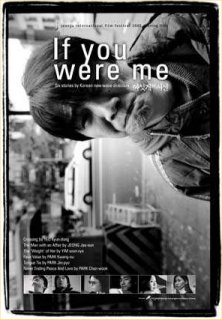 Other fellow omnibus riders are Yim Soon-rye (Three Friends, Waikiki Brothers) whose "The Weight of Her" addresses discrimination towards women; Yeo Kyun-dong (Director - Out to the World; Actor - To You, From Me) whose "Crossing" utilizes a troupe of disabled actors to present how they themselves experience discrimination; Park Kwang-su (Chilsu and Mansu, A Single Spark) whose "Face Value" looks at discrimination along gender and class lines; and Park Chan-wook (JSA, Oldboy) whose short "N.E.P.A.L: Never Ending Peace And Love" addresses the discrimination faced by immigrants in South Korea.
Other fellow omnibus riders are Yim Soon-rye (Three Friends, Waikiki Brothers) whose "The Weight of Her" addresses discrimination towards women; Yeo Kyun-dong (Director - Out to the World; Actor - To You, From Me) whose "Crossing" utilizes a troupe of disabled actors to present how they themselves experience discrimination; Park Kwang-su (Chilsu and Mansu, A Single Spark) whose "Face Value" looks at discrimination along gender and class lines; and Park Chan-wook (JSA, Oldboy) whose short "N.E.P.A.L: Never Ending Peace And Love" addresses the discrimination faced by immigrants in South Korea.
Each film tackles their chosen issue within a different style. Yim chooses montage; Jeong works within a haunting Orwellian view of the future; Yeo dares to be comedic in his take, reminding me of the American quadriplegic cartoonist John Callahan's political irreverence; Park Jin-pyo stays with what worked well the first time, cinema verite; Park Kwang-su incorporates his tale within a ghost story, and Park Chan-wook mock-docs his tale of horror. Park's short is oddly reminiscent of - or oddly foreshadows - what we witness in Oldboy, both revolving around a character unaware of who imprisoned them and why. (The producer of this short has said that Park considers "N.E.P.A.L." his personal favorite of all his films.) Each topic is handled expertly, and most of the actors involved are quite impressive, particularly the main actor in "Crossing", Kim Moon-ju, and his supporting cast from the disabled theatre group HWOL, whom I hope to see more of.
Although these are sensitive topics that are often ignored in mainstream media, I find myself referencing the many Korean films that have already tackled these issues in their own exemplary ways. Yim's short contains a scene reminiscent of Memento Mori. One can't help referencing Oasis in Yeo's short. And most interesting, Jeong's Take Care of My Cat takes care of ALL the issues represented, further solidifying its status as an essential South Korean film.
Still, even though such issues have been addressed in previous Korean films, this project is definitely a necessary and commendable one for all involved since the directors are basically airing South Korea's dirty laundry for all the world to see. When deciding to show this film in San Francisco this summer, I and Derek Song, manager of the Giant Robot store in San Francisco, were quite aware of how showing such a film might greatly upset those concerned about how their homeland might be represented to non-Koreans. However, rather than see this film as someone else's problems, a film such as this one allows me to reflect on the discrimination in my own country. When I'm watching Yeo's "Crossing", I find myself thinking about George Lane, the paraplegic who once had to crawl up the steps of a Tennessee courthouse to fight for his rights to access, rights recently enforced by the U.S. Supreme Court. When watching Park Kwang-su's short, I find myself shamefully recalling all the times I failed to intervene when privileged punks abuse their customer prerogatives on the cashiers just trying to make rent. And Park Chan-wook's short reminds me of Geraldo Rivera.
'Huh?' you say? Well, say what you want about Geraldo, but there might be a special place in purgatory for him thanks to the investigative piece that brought him into prominence. While investigating the horrible conditions of New York's State Mental Health hospitals, Rivera stumbled upon a mentally sound Deaf man who had gotten lost within the bureaucracy for no other reason than being unable to communicate to his "caretakers." Yeah, having just compared Park Chan-wook to Geraldo, I'm sure Q will slap me next time we meet up for sundubu jjigae, but, hey, that's what the film makes me think about. Along with that very special episode of M*A*S*H where we the viewer are the tracheotomy patient. (SMACK! 'Oww! Alright, I'll stop!')
All joking aside, If You Were Me demonstrates how multiple genres - including the comedy I just attempted - can have the intended impact regarding the efforts we still need to make, regardless of strides already made, towards equality in all of our countries. Because when we stop striving to improve ourselves and the lots of our fellow citizens, we've given up on this democratic experiment so many of us claim to cherish so greatly. (Adam Hartzell)
Watching this sucker-puncher of a movie in the venerable-but-revamped Hollywood Theater in Seoul, I felt like an old safari hand gazing in a mixture of ecstasy and awe at a Manchurian tiger sauntering out of a bamboo grove and locking its yellow-green eyes on mine.
It is a rare thing these days that a motion picture transports me back to the times that turned me into a lifelong film fan, when I felt in my bones the pleasures of discovering a new work, that spoke new languages and showed the things I had never seen before, yet did so in the manner that was also deeply familiar, because it was so solidly grounded in the idioms and conventions of the cinematic works that had come before it. A film that gives me the same sense of shock and pleasure that I felt when I saw Hitchcock's Vertigo (1958) or Roman Polanski's Chinatown (1974) for the first time in my life. Oldboy is one such film, sometimes thought to have become extinct in this age of mobile phones and video games.
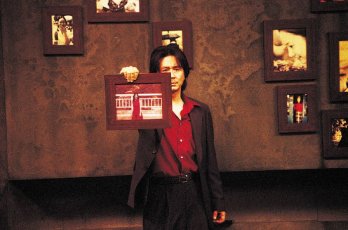 The diabolically talented writer-director of Joint Security Area (2000) and Sympathy for Mr. Vengeance (2002), Pak Chan-wook, determined not to repeat the commercial failure of Sympathy, has carefully plotted his counterattack, recruiting Choi Min-shik (Chihwaseon, Failan, Shiri) and Yu Ji-tae (One Fine Spring Day, Ditto, Nightmare), organizing the movie around their star personalities, and devising a mystery plot that revolves not around the question of "whodunit" but that of "whydunit."
The diabolically talented writer-director of Joint Security Area (2000) and Sympathy for Mr. Vengeance (2002), Pak Chan-wook, determined not to repeat the commercial failure of Sympathy, has carefully plotted his counterattack, recruiting Choi Min-shik (Chihwaseon, Failan, Shiri) and Yu Ji-tae (One Fine Spring Day, Ditto, Nightmare), organizing the movie around their star personalities, and devising a mystery plot that revolves not around the question of "whodunit" but that of "whydunit."
Oh Dae-su (Choi Min-shik), a grumpy businessman with a wife and a toddler daughter, is kidnapped by a group of gangsters. It turns out that they operate a private prison, and someone has paid them an astronomical amount of money to incarcerate him indefinitely. Compelled to rusticate for years and years inside a dingy, dark cell, with fried dumplings his only choice of menu, Oh is overcome with the desire for revenge. However, just when he is about to break free from his prison, he is dumped into the street. He hooks up with a young female sushi chef Mido (Kang Hye-jeong, the teenage guide from Nabi: The Butterfly), to locate the man responsible for robbing him fifteen years of his life.
The basic setup and title of the movie are derived from Tsuchiya Garon and Minegishi Nobuaki's Japanese comic, but the plot, characters and everything else have been completely re-worked. The movie blows away the ijime-obsessed faux-existentialist machismo of the original and instead plunges into the themes far more universally resonant, as ancient as the scarred bones interred in our ancestral tombs: the unrequited (and unrequitable) love and the Biblical suffering that such a love brings to the hapless, hypocritical animals that we are.
Choi Min-shik, looking like a mangled lion with a hyena-chomped black mane, gives the most electrifying performance of his career. His role runs the gamut from the Lee Marvin-like taciturn heroics of a seventies crime thriller to the spectacular implosion of a broken man, pitifully wailing and literally licking the shoes of his enemy, and everything in between. The film's final image, Choi's vacantly joyful, yet infinitely sad smile, will etch itself into your retinas and refuse to fade for a long, long time. Yu Ji-tae uses his lean, equine physique and contemptuously bland voice to illustrate an almost surrealistic character, part a villain in a James Bond movie, part a Greek God fallen from Mount Olympus and releasing his pale furies against the mortals. The movie's real acting revelation, however, may well be Kang Hye-jeong, at turns dangerously sexy and achingly vulnerable. There is little doubt that this role will launch her into stardom.
One could easily compile a book analyzing shot by shot the techniques used in Oldboy, its multiple parallels, extravagant leaps and surgically precise abbreviations. There is something ingenious, interesting or at the very least eye-catching in practically every shot of the film. The dialogue is also amazing, the previously unheard-of Korean that somehow combines the rhythm of Bond-film one-liners, the tone of lyrical poetry and the dry wit of the narrations in a hard-boiled crime novel, arch and fluid one minute, pitiless and cutting to the bone the next.
Oldboy is definitely not the kind of film that can win the endorsement of every viewer. A sizable number of the audience will no doubt find the film's resolution or even thematic material repulsive. Others may be turned off by its excesses that occasionally slip into plain weirdness (Do we really have to see Choi Min-shik chowing down a squirming, live octopus headfirst?). Its violence, while not as unblinkingly brutal as in Sympathy, is still disturbing enough to generate an NC-17 rating if turned over to the MPAA.
In the end, though, even its excesses and manic quirkiness are part of Oldboy's design. Unwatchably ugly and breathtakingly beautiful, gut-wrenching and delicate, heartbreakingly emotional and coldly manipulative, mind-bogglingly entertaining and almost arrogantly artistic, Oldboy is a mass of contradictions that nonetheless coheres as a whole. It is unclear at this point whether the movie can eventually claim the position of a world-class masterpiece, but one thing is certain for me: Oldboy is without doubt the most purely cinematic (both in form and content) piece of work, the truest motion picture, released in South Korea this year. (Kyu Hyun Kim)
(Trailer: 300k)
Legend of the Evil Lake opens with the massacre of a primitive tribe by Silla's first king, Pak Hyeok-geo-se and his technologically advanced army. The tribal chief in death throes vows vengeance against Silla, but his soul is sealed in a lake by the First King's magic sword. The narrative resumes nearly one millennium later, circa A. D. 896, as the kingdom is showing symptoms of strain and the court is beset by constant rebellions. Queen Jinseong (Kim Hye-ri), troubled by the threats to the throne, leans on General Biharang (Jeong Jun-ho, My Boss My Hero, Marrying the Mafia), against the counsels of her ministers. However, he spurns the queen's romantic attentions in favor of his betrothed Jaunbi (Kim Hyo-jin), the daughter of an executed rebel. Unfortunately, Jaunbi becomes a victim of political intrigue and is thrown into the cursed lake. Possessed by the spirit of the tribal chief and transformed into a flying phantasm with superpowers, Jaunbi seeks to lay waste to Seorabeol, capital of Silla.
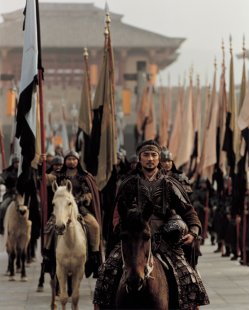 A remake of a 1969 film directed by Sin Sang-ok, Legend of the Evil Lake, despite excellent production values including extensive location shooting in the mainland China, did not do well in the box office. One of the reasons for its commercial failure may have been its El Cid-like "classical" tone, which, in my view at least, constitutes its major strength, and a factor that differentiates it from countless other period-pieces. The Evil Lake is an old-fashioned sword-and-sorcery epic, especially in its first half, its gory special effects notwithstanding. The plot is your basic love-triangle potboiler with healthy doses of medieval heroism and action, so hoary it might as well have been written on bamboo tablets with charcoal ink.
A remake of a 1969 film directed by Sin Sang-ok, Legend of the Evil Lake, despite excellent production values including extensive location shooting in the mainland China, did not do well in the box office. One of the reasons for its commercial failure may have been its El Cid-like "classical" tone, which, in my view at least, constitutes its major strength, and a factor that differentiates it from countless other period-pieces. The Evil Lake is an old-fashioned sword-and-sorcery epic, especially in its first half, its gory special effects notwithstanding. The plot is your basic love-triangle potboiler with healthy doses of medieval heroism and action, so hoary it might as well have been written on bamboo tablets with charcoal ink.
That the film never really bogs down in its ur-melodramatic plot until the climax is a testament to the talent and hard work of the production team, who, working with the medium-high budget of approximately 5 million dollars, create a series of beautiful, epic-sized vistas and soundscapes very pleasing to the eyes and ears. The DPs, Lu Ye (Zhang Yimou's Shanghai Triad [1996]) and Kim Yoon-su (Memento Mori [1999], Last Witness [2001], My Teacher Mr. Kim [2003]), have done a remarkable job, especially in integrating the vast backdrops of the film, the waters and mountains of China, into its more intimate, character-oriented aspects. In the wire action supervised by Yuen Tak (who has worked for many Jet Li vehicles), he manages to pull off some virtuoso stunts, including Jaunbi's low gliding flight culminating in a dive into the lake, which I am pretty sure was not done with CGI and is darn impressive. However, another point of pride for the production team, the huge sets made available from China, turns out to work against the film's verisimilitude. They are too easily recognizable as imperial Chinese: the ancient kingdom of Silla should appear much more "alien" to modern viewers like us than it is in this film.
The direction by Lee Kwang-hun, who previously helmed Dr. Bong (1995) and Ghost in Love (1999), is solid if somewhat ponderous. Even though the Sin Sang-ok version was primarily a showcase for its star actresses, the new film's leads are rather lacking in the charisma department. Jeong Jun-ho and Kim Hye-ri have little chemistry together, even though their fans will probably be pleased. Newcomer Kim Hyo-jin is certainly a trouper but her rouge lips and huge eyes occasionally threaten to overwhelm her performance.
Slickly put together, predictable and ultimately without much aspiration beyond entertainment (Excalibur it most certainly is not), The Evil Lake, on its own undemanding level, is an enjoyable fantasy: I certainly prefer it over Legend of Gingko (2000) and any number of Hollywood "updates" of ancient-medieval myths (the kind in which Guinevere fights in a battle wearing a tanned-leather brassiere). (Kyu Hyun Kim)
The unusual title of this introspective and well-executed film refers to the present continuous tense in English. For the film's main character Min-ah -- a high school girl who has spent much of her youth in the hospital -- the present may hold a deeper meaning than for most of us. Living with a disease can sharpen your appreciation for the ordinary days that pass before you. Min-ah's single mother, who has already lost a husband, has also learned to focus her attention on the present, rather than on a future that is struck through with uncertainty.
 One day, a young photographer (played by actor Kim Rae-won of Plum Blossom and My Little Bride) moves into the apartment below their home. He tries to win over Min-ah's friendship, first by stealing her lighter and later by calling her incessently on her new phone. Min-ah is quite put off by all this, and has no intention of becoming friends with him, although her mother seems to be encouraging her.
One day, a young photographer (played by actor Kim Rae-won of Plum Blossom and My Little Bride) moves into the apartment below their home. He tries to win over Min-ah's friendship, first by stealing her lighter and later by calling her incessently on her new phone. Min-ah is quite put off by all this, and has no intention of becoming friends with him, although her mother seems to be encouraging her.
With her debut film, young director Lee Eon-hee has created a simple, moving story as well as one of Korean cinema's most vivid mother-daughter relationships ever. Im Su-jung -- virtually everyone's choice for the best new actress of 2003, after her award-winning performance in A Tale of Two Sisters -- plays Min-ah with a convincing mixture of reclusiveness and vulnerability. Meanwhile the supremely talented veteran actress Lee Mi-sook plays Min-ah's mother with a cool, hip demeanor that hides the concern she feels underneath. The bond between mother and daughter is touching but also unconventional by Korean standards. Min-ah even refers to her mother by first name, virtually unheard of in Korea.
Directed with confidence and a clear-eyed perspective, ...ing is an overlooked film that manages to be both very sad and enjoyable to watch at the same time. It successfully captures a sense of what it feels like to be on the inside of an everyday tragedy, such as you might find in a neighboring home. At the same time, the film's warmth and humor help the viewer to appreciate the joy and poignancy of the present. (Darcy Paquet)
(Trailer: 300k)
A good friend of mine is Sikh, the faith of Indian origins that requires its strict adherents to refrain from cutting their hair, hair which men must cover. For all parents that struggle to get their children ready to leave the house, you have nothing on the Sikh parent who has to tie up their son's hair into a proper knot to place underneath the cloth turban. My media literate friend had finally given in and realized the only way she could get her little one to calm down while preparing his hair was to resort to turning on the turning out of an Elmo video. She was aware the sedation caused on her little boy by the video might not be helping his brain develop. But she needed to get him ready to go out and it seemed to be the only thing that worked.
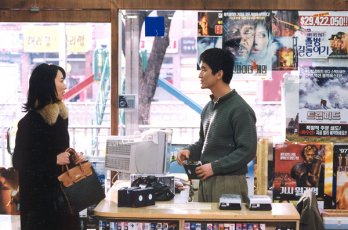 My friend came to my mind when a mother in A Man Watching Video, aka Rewind says she needs to keep re-checking out the same kid's video because it is the only thing that calms her daughter when she wakes up and discovers her mother isn't there. Her mother isn't there because of the economic necessity that requires her to work in a factory and the societal demand that prohibits affordable childcare assistance. Rewind provides a summary of the many different reasons behind why we watch videos/DVDs. Some customers seek to appease cultural mandates to watch the latest movie 'Available at a video store near you!'. Girls on the verge of womanhood seek erotic videos out of sexual curiosity. Watching a video together helps many over the, uhm, hump of initiating a romantic relationship where the choosing of a video also allows negotiation practice for a new couple. Still other customers might watch films to escape from boredom or merely as an atmospheric presence like a fish tank. I might choose to watch films with intent on writing about them for intellectual pursuits, but not everyone approaches film in this way. Videos/DVDs/Films do much more than simply entertain. Good thing, because some definitely don't entertain, so it's good to have alternative uses for them.
My friend came to my mind when a mother in A Man Watching Video, aka Rewind says she needs to keep re-checking out the same kid's video because it is the only thing that calms her daughter when she wakes up and discovers her mother isn't there. Her mother isn't there because of the economic necessity that requires her to work in a factory and the societal demand that prohibits affordable childcare assistance. Rewind provides a summary of the many different reasons behind why we watch videos/DVDs. Some customers seek to appease cultural mandates to watch the latest movie 'Available at a video store near you!'. Girls on the verge of womanhood seek erotic videos out of sexual curiosity. Watching a video together helps many over the, uhm, hump of initiating a romantic relationship where the choosing of a video also allows negotiation practice for a new couple. Still other customers might watch films to escape from boredom or merely as an atmospheric presence like a fish tank. I might choose to watch films with intent on writing about them for intellectual pursuits, but not everyone approaches film in this way. Videos/DVDs/Films do much more than simply entertain. Good thing, because some definitely don't entertain, so it's good to have alternative uses for them.
Such is somewhat the case with Rewind. The story centers around a character credited as "Video Man" (Jang Hyeon-seong - Git, Spider Forest), a law school dropout cum video owner who has recently divorced. His attachment to videos exhumes a longing he has always had. While watching a sex scene, we can see a pain in his face from the connection he seeks but is hesitant to allow himself to have. I say 'hesitant to allow himself to have' because it's not for want of suitors. His ex-wife (Oh Yoon-hong - The Power of Kangwon Province, Green Chair) appears ambivalent about their divorce. He's well aware bar owner Ms. Shin (Sa Hyeon-jin - The Wig, Beat), who owes him money, could be finagled into some type of relationship with benefits. He's possibly courted by a customer who thinks she's being stalked. And then there's the mysterious anonymous woman who drops real love letters in his return box instead of videos of the Pyonji ilk.
Yet another woman (played by veteran Bang Eun-jin) enters his life via a mis-returned, compromising video. Initially Video Man honestly doesn't recall the mistaken tape, but when he remembers his longing gets the best of him and he commits a passive act of voyeurism that exacerbates his fears and complicates a relationship that develops right in front of him. Of the various ways the film medium is used in our lives, Rewind focuses primarily on how some can use technology and its mediums to avoid the necessary vulnerability of relationships in the real.
As an independent film and a first effort by director Kim Hak-soon, I want to pause before I'm too hard on Rewind, but the film doesn't impress me much. I wonder if parts of what I'm missing from the film are the indigenous film references Kim might be making. It appears he's referencing Jang Sun-woo's wonderful The Lovers of Woomuk-Baemi and this may be the very film Ms. Shin recalls when she says she wants to go to Yangsuri. But lack of access to that film prohibits verification of that possible reference.
Still, I can incorporate the film into my own world well enough, regardless if I'll be feeling the film many months after my initial viewing. In this way, I play within this play of the various ways the medium of film and the technologies that make those mediums possible are used in society. Each medium and technology has its own use values and problems. When pressed to rank the various uses, I think there are better uses than others. Kim explores how, as much as we might love film, literature, sport, or other pursuits, sometimes those pursuits are utilized at the expense of relationships with our fellow humans. He also demonstrates how fate won't carry through completely with whatever was fated. Eventually action is required by the fated parties. Perhaps I will recall Rewind when I notice the change falling from my pocket. Change that signals a purchase that caused that change to be with me, just as change falling from his pocket signaled an everyday relationship that had stopped making an everyday appearance in Video Man's sedentary life. Or Rewind may sit amongst my DVDs never to be recalled again, gathering the dust of discarded memories. (Adam Hartzell)
"Yesterday, it rained all day long. Coming through the dust, I can hear your soft voice slowly moving away". These lines are sung by the protagonist Jang Jae-hyo and his friend Taxu who is not only the former's friend but also his employer. The scene demonstrates their long-time friendship and solidarity. Indeed, "[c]oming through the dust" is something the two Busan-based friends have in common; Taxu's struggling express service business, now unable to pay his employees, is forced to close down whereas Jae-hyo's eventual rift between his family and himself serves as the main plot of the film.
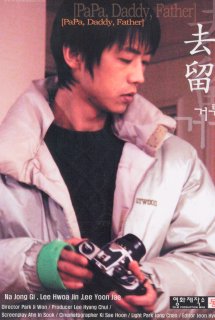 The opening scene takes place some time during Jae-hyo's childhood, showing the family captured and framed by his father's camera. The introduction reveals a man's desperate attempt to keep his wife, sons and daughter together, thus bringing to question the illusion of family unity as presented by director Park Ji-won.
The opening scene takes place some time during Jae-hyo's childhood, showing the family captured and framed by his father's camera. The introduction reveals a man's desperate attempt to keep his wife, sons and daughter together, thus bringing to question the illusion of family unity as presented by director Park Ji-won.
As alluded to by the film's English title, the narrative is based around three time periods: Jae-hyo's childhood (Papa), his youth and time in high school (Daddy), and his adulthood after serving his military service (Father). Each time period is a simple snapshot of the protagonist's life, but one which nonetheless provides the viewer with a clear picture of Jae-hyo's conflict, as well as insight into Korean family structures. The father repeatedly yells and hits Jae-hyo in an effort to discipline him, but the relation between the two deteriorates drastically after Jae-hyo loses his dad's camera on a school trip. The loss signalled the end of any and all possible reconciliation, the camera being the father's means of communicating with his family. The song mentions a voice fading away, clearly not implying that of the father's. He is the authoritarian patriarch who is concerned about the social image of his family but ignores his wife's implorations to spare their son. Among his friends, he proudly asserts to have brought his children up really well, while later in the privacy of home declaring Jae-hyo to be no son of his. Upon this proclamation, the son leaves and tries to make his own living with the help of father figure Taxu. As Taxu eventually ends up struggling himself, Jae-Hyo has no other choice but to return to his family.
This re-entry, the third time period, is the strongest part of the film. Its narration is sensitive and, combined with excellent direction and cinematography, is rendered convincingly real. Park Ji-won gives a strong insight into the dissensions of two generations in the bickering between father and son over a TV drama. As the son tries in vain to re-connect with his father, it is finally the latter who makes the biggest move. Presented throughout as a dominant character who rules over his wife and his children, he consciously abandons his former role allocations and in particular, seeks to amend the gender imbalance within the household. The mother, long-suffering and noticeably greyer, is shocked to discover her husband cooking rice. She has been waiting for this moment all her life and uses this opportunity to immediately engage her husband in other domestic work. The last scene insinuates that the mother has become the new head of the household. Not only does she make her husband and son do household chores, but she also bosses the two around almost comically. To recall the song which Jae-hyo and his friend Taxu share, the "coming through the dust" of the family is sung with a strong, authoritarian voice slowly retreating into the distance. (Nils Clauss)
Note: Papa, Daddy, Father was first screened at the 2003 Seoul Independent Film Festival in December. In 2005 this independent film was released in a DVD box set called "The True Heart Towards the World". It is produced as part of a support program run by the Korean Film Council (KOFIC). The collection contains five other independent features and documentaries from 2001-2004, touching on such topics as Korea's participation in the Vietnam War, Korean nationalism, military service in Korea, etc.
It's hard to look objectively at a film like Silmido. From the first time this risky, big-budget project was announced, a cloud of hyperbole has surrounded it. It was originally to be fully financed by Columbia Tristar -- the Hollywood studio's first foray into Korean cinema -- but later they pulled out, for reasons that are debated. Korea's own major studio Cinema Service took over the project, and gave it an $8 million budget -- extremely high by local standards. In the director's chair was Cinema Service's founder Kang Woo-suk, who has been described for close to a decade as the most powerful figure in the Korean film industry. The shooting of the film involved trips to Malta for shooting in a vast water tank, as well as a stopover in New Zealand to provide for scenes with snow cover. At the 2003 Pusan International Film Festival, a lavish dinner was held to serve as advance promotion.
 By the time it was released on December 24, a huge marketing campaign had stirred up interest in the film to a fever pitch. Audiences responded beyond anyone's expectations, and Silmido smashed through Friend's old record to become the first film to cross the 10 million admissions mark in Korea. Its theatrical gross topped $60 million, and the Samsung Economic Research Institute published estimates that it would provide direct and indirect benefits to the economy totalling $300 million. Together with Taegukgi, it became one of the two monsters of early 2004: held up as a symbol of Korean cinema's commercial success, while also becoming a target for critics' claims that smaller films were being overrun in Korea's unbalanced distribution sector.
By the time it was released on December 24, a huge marketing campaign had stirred up interest in the film to a fever pitch. Audiences responded beyond anyone's expectations, and Silmido smashed through Friend's old record to become the first film to cross the 10 million admissions mark in Korea. Its theatrical gross topped $60 million, and the Samsung Economic Research Institute published estimates that it would provide direct and indirect benefits to the economy totalling $300 million. Together with Taegukgi, it became one of the two monsters of early 2004: held up as a symbol of Korean cinema's commercial success, while also becoming a target for critics' claims that smaller films were being overrun in Korea's unbalanced distribution sector.
Amid all the hype and cash thrown around in the wake of its release, political issues emerged. The film is based on a real event that took place during the Park Chung-hee administration, and the publicity brought pressure on Korea's intelligence service to declassify files and shed light on what really happened. Meanwhile, citizens with a personal link to the dark incident objected to some of the character portrayals, and opened legal action to block its sale to overseas countries. Cinema Service later added a opening statement to the film to clarify its use of artistic license.
The real-life incident on which it was based involved a secret military unit established in 1968 on a remote island called Silmido, located off Korea's west coast. The unit's 31 members were charged with the task of infiltrating North Korea and assassinating its leader Kim Il-sung, in retaliation for an earlier assassination attempt on the Southern president. (In the film, the members of the Silmido unit were former gangsters or death row convicts, although it appears that in real life many of them were street cleaners and the like.) After being transported to Silmido and having their identities erased, the members of the unit were subjected to a unspeakably cruel training regimen, designed to turn them into invincible killing machines.
The film that results from such a dramatic setup is highly charged and unquestionably strong in parts, but also fraught with contradictions. Often compared to The Dirty Dozen, Silmido takes up an epic tone from the start, with heroic dialogue and a robust symphonic score. This epic packaging clashes somewhat with our expectations of seeing a real event from history. The film's strong masculine attitude, while perhaps justified, is also distracting at times, from the "tough love" portrayal of the training to the macho attitude of the unit. Spotting female characters in this film is a bit like playing Where's Waldo?, save for a nurse who is brutally raped by some of the film's more sympathetic characters.
As for positives... The cast is quite strong, with the acclaimed Sol Kyung-gu and Ahn Sung-ki joining a mix of famous and new actors in supporting roles, including Jeong Jae-young and Im Won-hee. Heo Jun-ho in particular, as a sergeant in charge of training the group, has earned deserved praise for his performance. The talent behind the camera is evident as well, from the action sequences choreographed by Jung Doo-hong to Kang's economical direction. The second half of the film in particular is well-executed and engaging.
It is perhaps typical of recent Korean cinema that the film never considers the potential consequences of the unit's mission. If they had indeed been successful in assassinating Kim Il-sung, there is little question that a second Korean War would have ensued, with unspeakable suffering on both sides of the border. However not only the characters, but the film itself overlooks this. Blame for the unit's creation is placed on some nameless bureaucrats, rather than the dictator Park Chung-hee himself (who still remains popular in many segments of Korean society). Despite locating the film within an authentic historical setting, the filmmakers are principally interested in the events' effect on (fictionalized) individuals. How these events may have emerged out of political systems, ideologies, or other aspects of 1970s Korean society is never really considered. As with Taegukgi, history becomes just a colorful backdrop on which to stage resolutely personal stories that could have occurred in any other country or time period.
I would argue that Silmido is not a film about history, but rather straight entertainment that mixes a highly melodramatic setup with gritty realism and bursts of action. Taken as such, the film is a success; at turns exciting and moving to watch. Deep within me, however, I still feel slightly uneasy with that analysis. If a film stakes a claim to portray a real event from history, what kind of responsibility does that entail? (Darcy Paquet)